Write an A+ Interview Paper Using Our Tips and Examples
06 September, 2021
13 minutes read
Author: Josh Carlyle
You will quickly find yourself with your back to the wall once your teacher assigns you an interview paper. Studying is often a headache by itself, and now you have to conduct interviews. Worse yet, you probably have no idea how you can do this. Luckily, we will tell you how to write an interview paper step by step in this comprehensive guide. So prepare your favorite drink and learn how to write a top-notch interview paper.
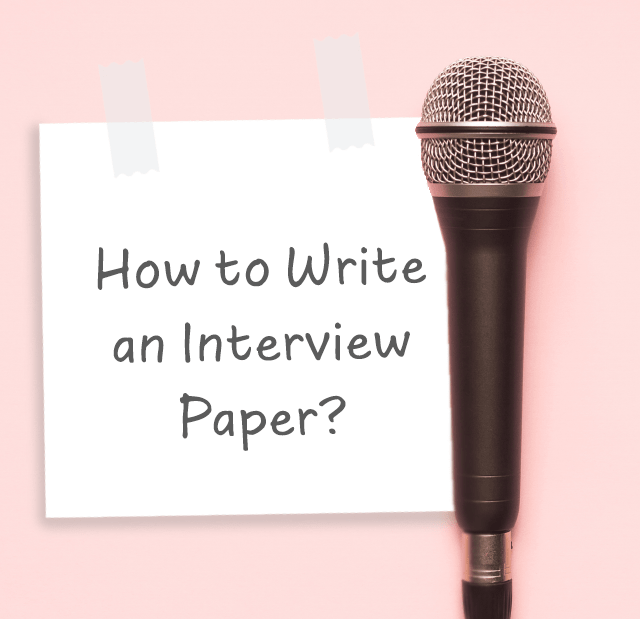

What is an Interview Paper?
An interview paper provides an expert opinion on a specific issue. In essence, it is an interview transcript inserted somewhere between the introduction and conclusion of an academic piece.
How long should it be? It depends on the topic and the length of your interview, but most papers are within the length of 2,000 – 5,000 words. What things should you consider before writing an interview paper in the first place? Let’s check them out below.
General Aspects of Writing an Interview Paper
Academic papers require you to provide arguments based on studies, research pieces, statistics, etc. But an interview paper is different – for this type of essay, you will develop assumptions around an expert’s opinion.
Let’s imagine your essay question reads the following: “Should we ban abortions?” If you write an interview paper, you should ask someone high-powered for their consideration. Let them be an executive director of the American Gynecological & Obstetrical Society.
You would reach them via email or phone or whatever communication channel you prefer and conduct an interview. Afterward, you would put all your findings on paper.
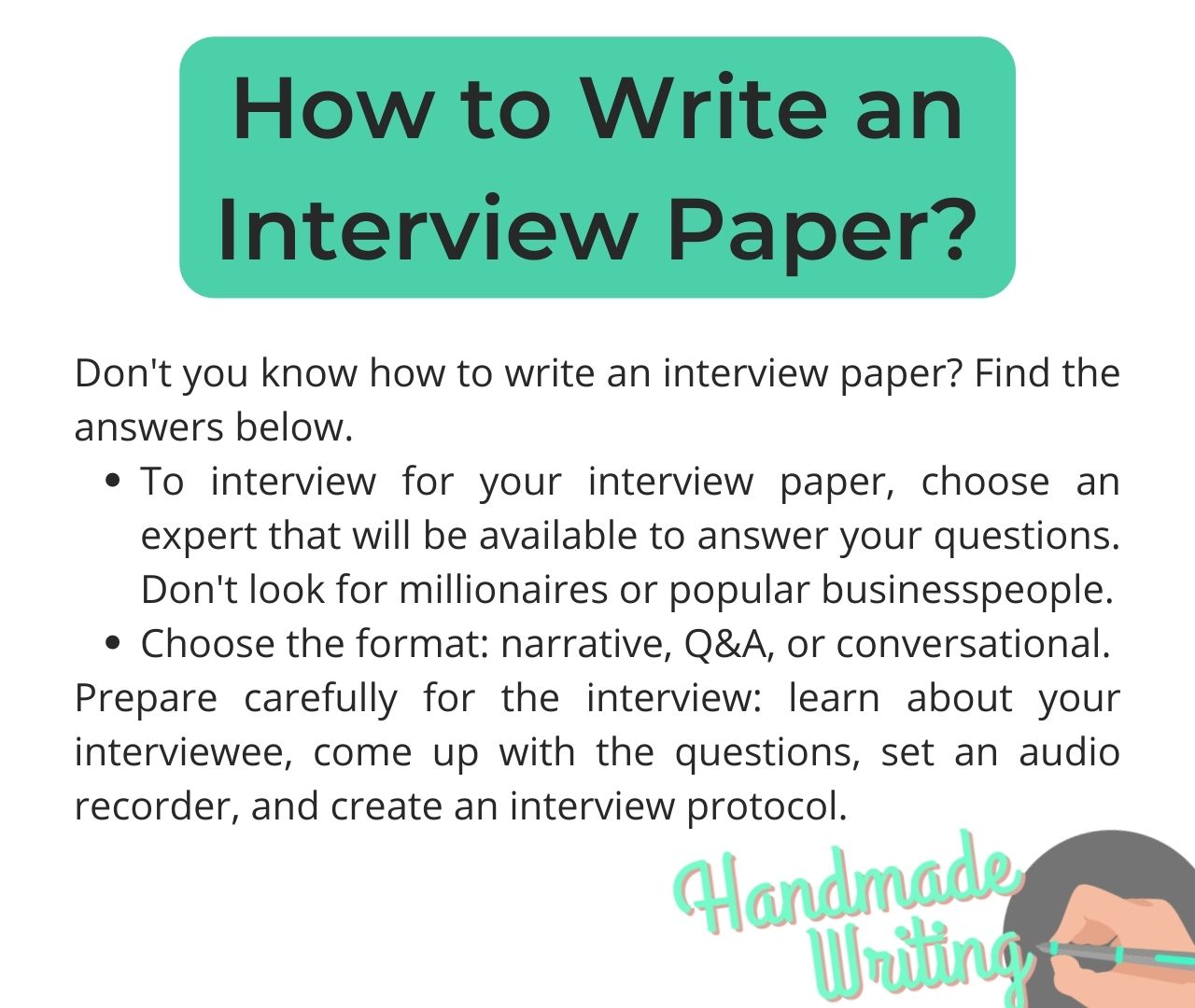
But in practice, writing an interview paper involves many more complexities and challenges, like planning, topic research , drafting, etc.
Let’s speak straight facts: nobody will reschedule their week to meet you because you need to do some homework. You’re one of the millions of students, and the local governor or a famous scientist won’t give you an interview nine times out of ten.
So you would want to target someone less busy, like professors from other faculties of your college or some researchers within your academic environment. Hunting a bigger fish is pointless unless you’re a well-established journalist working for a popular media channel. If you struggle to find someone within your college/university, you can contact people from your circle.
Writing Outline and Structure of an Interview Paper
As you know, a typical paper consists of three parts:
- Introduction. This part includes background information, the hook, the thesis statement, and the transition.
- Body. It is the longest part of the paper consisting of several paragraphs. It should contain the actual interview.
- Conclusion. The final part summarizes the considerations and insights of your essay.
The question is: ‘where should you put an interview transcript and how do you do this?’
To answer this question, you need to come up with the interview papers format in the first place. There are several of them:
The narrative format implies that you can use either direct or indirect speech when referring to your interviewee. If you choose this path, you can stick to a 5-paragraph essay structure, retell the considerations of your interviewee, and cite their words here and there at your discretion.
You can also choose this format if you contact several people. Check what a narrative interview paper structure looks like when you reach out to several people:
- Introduction.
- Paragraph #1 – the first interviewee’s perspective.
- Paragraph #2 – the second interviewee’s opinion.
- Paragraph #3 – the third interviewee’s thoughts.
- Conclusion.
Alternatively, you can dedicate each paragraph to a particular idea of one person.
“Question and answer” will suit your needs perfectly if you interview one person. It is the simplest format used in online magazines, news reports, and other media. Your interview paper outline will look like this:
- Introduction
- Question #1 – Answer #1
- Question #2 – Answer #2
- Question #3 – Answer #3
- Question #4/5/6/etc. – Answer #4/5/6/etc.
- Interview analysis. You may include your thoughts on the subject matter.
Conversational
Conversational style is informal, and you can use either first-person or second-person narrative and follow a typical 5-paragraph paper structure. But writing interview papers in this lousy style might be perplexing, especially if you deal with this task for the first time.
We advise you to try the Q&A format because it’s the simplest one and takes the least time. Just imagine how much time your paper writing will take if you decide to interview three or five people.
How to Start an Interview Paper?
If you have no idea how to start an interview paper, choose the topic first. Selecting a topic for your interview paper is not a big deal, but you should keep in mind that you may not find appropriate interviewees for it.
Let’s imagine you want to explore whether the government should force people to get vaccines. This topic implies that you need to contact authorities. It might be a local lawyer, governor, or executive director of a local hospital. Well, the chances are these people will politely refuse to give an interview for your homework.
But if you choose to investigate how lockdown impacts intellectual workers, you can contact your friends or family members who work at home. In other words, it’s better to choose topics that reflect the experiences of ordinary people rather than the opinions of untouchable experts.
Asking people for their opinion about well-known facts like the Earth’s shape is a bad idea. You would want to choose high-profile debatable topics you can actually discuss.
Establish the Goal of Your Interview Essay
You have to establish the goal of your essay before researching the topic. For this, ask yourself: “What message should your interview essay deliver?” Sometimes, a topic of your choice might already explain the purpose of your essay.
Conduct Research
Interviewing someone implies that you should ask questions. But you will fail to do so if you know little to nothing about your topic. So read some case studies, news, articles, etc. Once you get the picture of your subject matter, you will come up with dozens of interview questions.
Get to Know Your Interviewee
A good interviewer always refers to the life and experience of their interviewee. If you’re lucky to work with someone you can read about on the Internet, find out as much information about them as possible. If your interviewee publishes any books, articles, or studies, you will better know them as well.
The more you know about the person, the more interview questions you can come up with. You can ask them whether the Internet tells their true story: “Is it true that you, Mr. Interviewee, support flat earthers?”
Draft Your Interview Questions
If you want a person to share their in-depth vision of the topic, you need to ask both open-ended and close-ended (“yes/no”) questions. However, you may struggle to prepare interview questions. Many students get stuck during this stage. To overcome this block, you need to learn some types of interview questions:
- Opinion – What do you think of this topic?
- Behavioral – What would you do in this situation?
- Experience and knowledge – What do you know about the subject?
- Background – How are you connected to the subject? What is your age, occupation, etc?
- Emotional – How do you feel about the subject?
- Sensory – What does the subject taste and feel like?
You can also think of the questions following the interviewee’s “yes” and “no” answers.
Tips for Conducting a Successful Interview
These four tips will help you conduct a productive interview on the first try:
1. Plan Your Meeting
Note that you want to interview a person in a quiet place so that nobody will distract you. This might be some cozy book store or a café. Or, you can arrange an online meeting. Make sure you have at least one hour for the interview.
2. Rehearse a bit
If you will conduct your first-ever interview, you want to practice with your friends/significant other/ family in the first place. This approach will help you identify what stage of your upcoming interview may challenge you the most.
3. Record Your Interview
You will forget about 50% of the information within an hour once you finish the interview. So don’t rely on your memory − bring a recorder instead. Why not take notes? You wouldn’t want to go red while asking your interviewee to repeat what they have just said or wait until you write down their answers.
4. Talk to Your Interviewee for a While Before You Begin
Speaking to someone you don’t know might be uncomfortable. You don’t have to attack them with your interview questions straightaway. Instead, you can exchange some casual phrases or discuss the weather. This will help you relieve stress and get comfortable with each other.
5. Explain Your Interview Protocol
It’s better to explain to your interviewee how you will conduct your interview. Tell them that you will use a recorder and introduce the discussion topic.
Interview Papers Format

In academic writing, you have to explain the purpose of your interview and introduce your interviewee in a specific “scholarly” format. The APA format interview paper has the following requirements:
- Use 12-point Times New Roman.
- Write a title page.
- Use double spacing.
- Introduce your interviewee and provide the background information – explain why this person is suitable for the interview. Mention their name and qualifications.
- Use direct quotes if you cite some facts provided by the interviewee.
- Use block quotes for citations longer than 40 words.
How to Write a Title Page?
The title of your paper must include your name, your institution, department, the course name and number, the teacher’s name, and the assignment date. The rules of writing the title page are the following:
- The title page must be numbered.
- Capitalize all major words in your title and make it bold.
- Place the title of the essay three or four lines down the top of the page.
- There must be one empty line before the student’s name.
Interview Papers Examples
If you’re searching for an interview essay example – check several samples below:
- A narrative interview essay .
- A Q&A interview format paper.
- An interview with a scientist.
Interview Papers Writing Tips
The following writing tips will help you deliver the first-class interview paper:
- Write the introduction at the end. Once you finish your essay, you will likely reconsider some ideas you had before you began. They will help you frame your interview essay with a captivating introduction and conclusion.
- Give yourself a break after finishing your final draft. This will help you look at your paper with a fresh pair of eyes once you start editing.
- Edit one type of error at a time. For example, you can reduce logical errors first and switch to grammatical mistakes afterward.
- Use an active voice. If active voice makes your sentence shorter, use it without hesitation.
- Check for any sample interview paper to decide on the interview questions. Perhaps, some pieces will spark your interest.
Writing Help by Handmadewriting
An interview paper doesn’t seem that intimidating once you learn how to write it step by step. First, you have to choose the subject that allows you to interview ordinary people rather than hard-to-reach ones. Then, you need to research your topic, conduct an interview, and write a paper.
You can get an A+ for this assignment with enough effort and dedication. But a doable task doesn’t necessarily mean that you must do it by yourself. If you have plenty of other assignments to do, you can ask our essay writers to craft an exemplary interview paper for you. For this, you can place an order on our website, and we will do all the dirty work.

A life lesson in Romeo and Juliet taught by death
Due to human nature, we draw conclusions only when life gives us a lesson since the experience of others is not so effective and powerful. Therefore, when analyzing and sorting out common problems we face, we may trace a parallel with well-known book characters or real historical figures. Moreover, we often compare our situations with […]

Ethical Research Paper Topics
Writing a research paper on ethics is not an easy task, especially if you do not possess excellent writing skills and do not like to contemplate controversial questions. But an ethics course is obligatory in all higher education institutions, and students have to look for a way out and be creative. When you find an […]

Art Research Paper Topics
Students obtaining degrees in fine art and art & design programs most commonly need to write a paper on art topics. However, this subject is becoming more popular in educational institutions for expanding students’ horizons. Thus, both groups of receivers of education: those who are into arts and those who only get acquainted with art […]
- PRO Courses Guides New Tech Help Pro Expert Videos About wikiHow Pro Upgrade Sign In
- EDIT Edit this Article
- EXPLORE Tech Help Pro About Us Random Article Quizzes Request a New Article Community Dashboard This Or That Game Popular Categories Arts and Entertainment Artwork Books Movies Computers and Electronics Computers Phone Skills Technology Hacks Health Men's Health Mental Health Women's Health Relationships Dating Love Relationship Issues Hobbies and Crafts Crafts Drawing Games Education & Communication Communication Skills Personal Development Studying Personal Care and Style Fashion Hair Care Personal Hygiene Youth Personal Care School Stuff Dating All Categories Arts and Entertainment Finance and Business Home and Garden Relationship Quizzes Cars & Other Vehicles Food and Entertaining Personal Care and Style Sports and Fitness Computers and Electronics Health Pets and Animals Travel Education & Communication Hobbies and Crafts Philosophy and Religion Work World Family Life Holidays and Traditions Relationships Youth
- Browse Articles
- Learn Something New
- Quizzes Hot
- This Or That Game New
- Train Your Brain
- Explore More
- Support wikiHow
- About wikiHow
- Log in / Sign up
- Education and Communications
- College University and Postgraduate
- Academic Writing
How to Write an Interview Essay
Last Updated: March 11, 2024 Fact Checked
This article was co-authored by Diane Stubbs . Diane Stubbs is a Secondary English Teacher with over 22 years of experience teaching all high school grade levels and AP courses. She specializes in secondary education, classroom management, and educational technology. Diane earned a Bachelor of Arts in English from the University of Delaware and a Master of Education from Wesley College. This article has been fact-checked, ensuring the accuracy of any cited facts and confirming the authority of its sources. This article has been viewed 459,865 times.
An interview essay is designed to give the reader a general impression of the interview subject and to present their thoughts on a select group of topics. It also offers the opportunity to develop deeper insights by analyzing the interviewee's responses within a larger context. Interview essays are a common school assignment, and provide useful skills for those interested in journalism, or just being good writers in general. There are several formats that fit into the category, but a good interview essay of whatever type can make the reader feel as though they were asking the questions.
Interviewing for an Essay

- If your essay is to be a factual piece, you'll want to interview someone who has expertise in the subject matter you'll be addressing. If your paper is about a science topic, you'll want to interview a scientist in that field. If your paper is about a period of history, you'll want to interview either a historian or someone who's lived through that period of history.
- If you plan to make your essay an opinion piece, you'll likely want to interview someone who has a strong opinion about the topic covered in your essay. Ideally, you want someone who can express opinions articulately, and who also has credentials in the area you plan to write about.
- If your piece will have a narrow perspective, you'll need to interview only one or two people. If your piece will present a general consensus, you'll need to interview more people, probably with varying expertise and credentials.

- When available, read works about and works written by your subject, both in print and online. At the same time, research the topic associated with your subject. The more you know about both, the more intelligent questions you can ask.
- Look for previous interviews your subject has given, as well. These will give you an idea of what questions the person has been asked before, so you can decide on appropriate subjects for your own questions, including questions that no one else has asked.
- Questions that require "yes" or "no" answers are good for gathering specific factual information; open-ended "how," "why," and "tell me about" questions are great for gathering additional background material not found in your research.
- Draw up a list of the questions you are prepared to ask. Have more questions ready than you will likely use, so that you can make adjustments as the interview takes place. (For instance, your subject may begin focusing on what you thought was a side topic, but turns out to be the key part of your interview.) Rank your questions in order of importance to make sure you ask your best ones, or list them all in the order you'd ask them and color-code the most important ones.

- Choose a quiet place with few distractions for your interview site. A library, restaurant, or campus location if you're doing this for a college writing class would be suitable.
- You may want to get the interviewee's consent to use their comments in your essay in writing, as well as permission to record those comments during the interview. By law, if you are recording an interview conducted over the phone, you must obtain written permission. [4] X Trustworthy Source University of North Carolina Writing Center UNC's on-campus and online instructional service that provides assistance to students, faculty, and others during the writing process Go to source
- It's helpful to have a backup interviewee in case the person you plan to interview can't make it.
- Be on time at the place you've agreed to meet for the interview.

- Using a recording device (with permission) is almost always advisable, as it permits you to save your note-taking for jotting down your insights on contexts, themes, how your subject approaches the questions, his/her comfort level, and so on.
- Be patient and respectful as you ask your questions and wait for responses. Give the interviewee time to reflect, and you will likely be rewarded with more insightful answers. A few deeper responses are usually better than many superficial ones.
- Immediately after the interview, write down your thoughts and impressions about the interview and interviewee. They may help you shape the essay.
- Always end the interview by thanking the person.
Writing the Essay

- Narrative format. This form allows paraphrasing of some information the interviewee says, along with direct quotes for the material you most want to emphasize. This is the most likely format for a class assignment, and offers the most opportunity to add context and analysis.
- Conversational format. This is a looser format than the formal writing style required for most essays. You can address the reader directly and use both first and second person. This format can be suitable for anything from class assignments to magazine articles.
- Question-and-answer format. This form presents your questions to the interviewee, followed by the interviewee's responses. (That is, the text looks something like this: (Your Name): How long have you been in the circus? (Interviewee's Name): About 35 years.) These are always direct quotes, although you may insert explanatory material in parentheses and substitutions, such as a person's name in place of a personal pronoun, in brackets. This format is best suited for essays with only a single interviewee or a closely related group, such as spouses or the core cast of a TV show.
- Informative format. This format usually interweaves the interview with research you've done on the subject, incorporating some of that research in the text to provide background and give it a little more color.

- Read over your interview notes and listen to any audio / video recordings you have. Utilizing both whenever available will allow you to thoroughly consider both the highlights of the interview and the most significant themes to emerge from it. These, in turn, will inform your outline of what information your essay will cover and how it will appear. [9] X Research source
- One possible outline could be an introduction that starts with an anecdote about the interviewee and then presents your thesis statement, several key points that support the main focus, and a conclusion that summarizes the information presented. Traditional school essays often utilize a five paragraph format (introduction, three supporting paragraphs, conclusion), and this can often work with interview essays as well.

- If, however, the purpose of your essay is to use your interviewee's comments to support a position or examine a larger theme, your thesis will probably be a statement of that position or theme, with the interview / interviewee placed within that context. For instance: "John Doe's mixed feelings of pride and betrayal reflect those shared by many Vietnam veterans still with us."
- Regardless of essay format, make your thesis clear and concise, and be sure that the remainder of your essay refers back to it. See How to Write a Thesis Statement for more advice.

- Interviews can sometimes produce a good deal of repetitive answers (even with high-quality questions), so you may need to trim repetitions and unnecessary elements from the body of your essay. Make sure that whatever material you do keep remains true to both the spirit of the interview and the overarching focus of your essay. [10] X Research source
- A handout from the Writing Center at the University of North Carolina (available at http://writingcenter.unc.edu/handouts/oral-history/ ) provides a wealth of valuable materials on interview essays. It includes, for instance, examples of how to utilize the same interview materials in a transcription (question-and-answer format), a presentation of individual experiences (quotations and paraphrases), and the placing of the interview / interviewee in a larger context (paraphrasing and quotations with ample explanation).

- Reading over the essay yourself is a good start, but it is always wise to have another set of eyes look it over as well. Another reader is likely to catch errors, repetitions, and unclear sections that you have glossed over. [12] X Research source
- Go back to your original interview notes, recordings, and transcripts, and make sure that your essay continues to reflect the actual interview. Layers of editing and revising can sometimes cause the essay to drift away from the original source and intent. You may even want to let the interviewee read it over to ensure that it captures their voice. [13] X Research source

- Any materials you used for research, information about the interviewee, or context for the essay itself should be referenced in the approved citation format for your essay.
- Make sure one more time that any direct quotations from your source are placed in quotation marks, and any paraphrasing is done without quotation marks. Don't put words in your subject's mouth, and respect the words that do emerge from it.
What Are The Dos And Don’ts Of a Journalistic Interview?
Expert Q&A

- After the interview, send the interviewee a written thank-you note expressing your appreciation for their time. Thanks Helpful 0 Not Helpful 0
- If the person you're interviewing is busy or elderly, you may want to plan for more than one interview session. Observe the interviewee for signs of impatience or fatigue. Conduct multiple, shorter sessions if necessary. Thanks Helpful 0 Not Helpful 0

- If you plan to interview someone over the telephone, permission to record the conversation is required by law. Thanks Helpful 15 Not Helpful 3
You Might Also Like

- ↑ http://writingcenter.unc.edu/handouts/oral-history/
- ↑ https://www.indeed.com/career-advice/interviewing/interview-paper
- ↑ http://www.whatkidscando.org/featurestories/2007/maine_students/tip_sheets/FIRST-PERSON%20ESSAYS%20TIP%20SHEET.pdf
- ↑ http://www.brighthubeducation.com/help-with-writing/97515-how-to-write-an-interview-essay/
- ↑ https://owl.purdue.edu/owl/general_writing/the_writing_process/proofreading/proofreading_suggestions.html
About This Article

To write an essay from an interview, you’ll first have to decide on the format the essay will take, as this will determine the structure and what you write. The most common form is the narrative format, in which you use direct quotes and paraphrase your subject to add context and detail, or you can write in a more conversational tone, or even in a directly transcribed question-and-answer form. Once you decide on format, plan an outline by forming a central thesis, which will be the central statement your essay is making. Add onto the outline by drafting supporting evidence directly from the interview and from other sources, like books, newspaper articles, other essays, anything else to support your point. Write and finish the essay by combining information from the interview and other sources with your own explanations and words. To learn about how to conduct the interview to get enough information to write about and how to finish the writing process, keep reading! Did this summary help you? Yes No
- Send fan mail to authors
Reader Success Stories
Oct 19, 2016
Did this article help you?
Tyler Jordan
Sep 11, 2016
Tawana Moos
Nov 20, 2017
Mar 28, 2016
David Mcaniel
May 23, 2017

Featured Articles

Trending Articles

Watch Articles

- Terms of Use
- Privacy Policy
- Do Not Sell or Share My Info
- Not Selling Info
Get all the best how-tos!
Sign up for wikiHow's weekly email newsletter
How to Write an Interview Essay: Complete Guide
College and high school teachers often assign interview papers to test their learners’ planning, paraphrasing, and critical thinking skills. So, besides drafting a well-substantiated and information-packed piece, students must also organize and conduct an interviewing process.
Hence, this assignment is far from straightforward. Quite the contrary, it requires substantial pre-work before the actual meeting. Moreover, the task further complicates if you include several subjects or elaborate on a compelling theme.
What if you can’t meet an ideal candidate to elaborate on your topic? How to pose questions that reveal valuable information and present your findings on paper? How to write an interview essay introduction with attention-grabbing ideas that bring up current dilemmas or resolve an issue? There are so many trilemmas spinning around your head.
Fortunately, there’s no need to feel intimated or discouraged. This article will help you grasp the basics of an interview paper and how to write an outstanding piece. It will also discuss the steps involved in the writing process and give a few helpful tips that ensure your final product passes with flying colors.
What Is an Interview Essay?
An interview paper is an academic written piece that presents the insight the interviewer gained while interviewing one or several people. It aims to expose different perspectives on a particular topic once the writer gathers relevant data through research. Typically, the essence of the paper will rest upon your findings from the interviews.
The presented viewpoints will depend on the respondent. So, for example, if your paper interview focuses on social media, you might consider talking to an influencer. Conversely, if you’re elaborating on a burning social issue, you may want to speak to a local authority. Or set up a meeting with a scientist if you’re exploring natural sciences.
The interview paper must help the reader understand a concept backed by relevant statements. Unlike definition essay writing , where you paraphrase and cite trusted sources like scholarly books, the interview paper will stem from authoritative individuals in the respective field.
Finally, you can reap a lot of benefits from drafting interview essays. More specifically, those interested in becoming broadcast journalists, newspaper reporters, or editors will learn to pose thought-provoking questions. Similarly, HR managers will polish their screening ability and hire excellent candidates. Even prospective detectives and inspectors can gain from writing an interview essay. They will formulate a variety of engaging questions to get honest and accurate answers.
Outline and Typical Structure of an Interview Paper
Most essays follow the template of a basic 5-paragraph paper. Yet, the length can vary according to your subject and data availability. A standard interview essay from a custom writing service can range from 2,000 to 5,000 words or up to ten pages. Individual works are usually shorter.
The interview essay format will have an introduction, body segments (perspectives grouped under different subheadings), and a summary. Here’s an overview of what to put in each part.
Introduction . The writer needs to create an atmosphere of uncertainty and urgency to stimulate the audience to keep reading. It should also provide background information about the theme and the interviewee. Furthermore, the initial part can list statistics or what society thinks about the respective topic. Finally, your intro must contain a thesis that transitions into the main section.
Body . This part will present the pillars on which you conceptualized your research. If you get stuck while drafting the body, you might hire an online service to write an essay for you and incorporate the gathered data. They will isolate the main points and help you frame the perfect timeline of events.
Moreover, the body should reflect important facts, life periods, and considerations of your interviewees. For instance, you might split your paper into infancy, adolescence, university, marriage, and golden years. Or you might divide your segments according to different discussion questions.
Conclusion . Use the ending part to summarize the interviewee’s thoughts and your insights into the matter. You might also compare the available data to the facts collected during the meeting and verify their validity. The bottom line must leave a lasting impression on your audience.
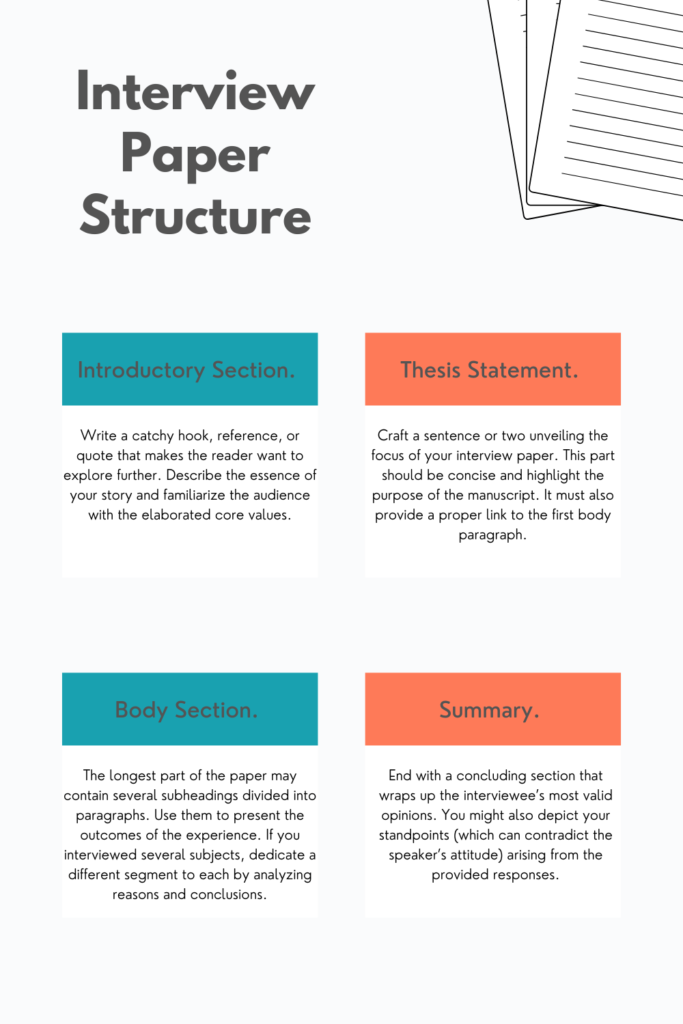
Steps for Writing a Successful Interview
Below is a detailed description of the paper composition journey. Consider each step carefully and be consistent in your approach.
Define the Paper’s Objective
Writing an interview paper urges you to establish the overall purpose. You will have to specify the message you plan to deliver. For example, if you want to verify a public opinion, you’ll have to question several subjects. Alternatively, proving a natural phenomenon will require a conversation with an expert in the field.
Explore the Subject
Find and prepare printed and virtual materials related to your research. Previous interviews and works by the interviewee are also vital. Unlike rebuttal essays , your primary goal is to gather details supporting your claims. Therefore, brainstorm any note you found based on your predefined criteria.
Pick an Interview Format
Your sample form will depend on the specific theme. Most students decide to buy a literature essay online due to their lack of formatting skills. Here are the various formats you can choose when presenting your findings.
This format implies using direct or indirect speech to analyze the storyline. Consider retelling the considerations of the interviewee and citing the original wording. The narrative format is also advisable if you talk to a few interviewees. The structure should contain an intro, a body (each paragraph can describe a particular idea of a single person), and a summary.
Question-and-answer essays are ideal when interviewing one person. Most magazines and news reports prefer this type because it is the simplest. Your interview paper will have an intro, different parts for each question and answer, an analysis with your perspective, and a summary.
Informative
Also known as conversational or personal, these papers are informal and take first or second-person narration flow. However, writing in a dialogue form might be confusing and perplexing for an untrained eye.
Formulate the Questions
Make a thorough list of all the aspects you want to discuss and cover in the interview paper. Ask close-ended (yes/no) and open-ended questions that require in-depth responses. If you struggle with your questionnaire, consider the following suggestions:
- Share your core values
- What would you change in the world if you had a superpower for a day?
- How did your childhood impact your personality?
- What is the recipe for success?
- What is the best aspect of your job?
- How do you overcome your deepest fears?
- Define happiness with examples
- What object do you hold most dear and why?
- What is the most significant challenge in our society?
- How do you imagine the world’s future?
Get in Touch with the Respondent
Make an effort to contact your interviewee/s and be professional when arranging the meeting. You might need to use several communication channels to reach your target person. Focus on scheduling a time that works for everyone involved in the project.
Facilitate the Interview
Choose a peaceful and quiet place without any distractions. Always arrive on time for the meeting. Alternatively, consider setting it up in an online format, if finding a physical location isn’t viable. Most importantly, allow the speakers enough time to share their thoughts and maintain an impartial attitude to avoid miscommunication.
Interview Essay Writing Tips
Here’s some additional advice for writers taking the first steps toward interview writing.
Stick to Your Teacher’s Instructions
Your professor will probably mention the paper structure. For instance, if you receive a classification essay writing guidelines , don’t experiment with other formats. Moreover, rehearse the face-to-face meeting with a family member to avoid possible deadens. Here, you might come up with a follow-up question that clarifies some vague points.
Quote and Paraphrase Your Sources
Organize all the details on the background, education, and achievements before interviewing itself. When referring to the topics discussed, cite them properly and give credit. Also, explain the protocol to the respondent and the purpose of the research.
Consider Recording the Interview
The longer the meeting, the more details you’ll forget once you finish it. Avoid over-relying on your memory, and bring a recorder. Taking notes is also essential. However, don’t record unless the respondent gives prior approval.
Mind These Formatting Rules
Use a font size of 12 in Times New Roman with double spacing. Don’t forget to write a title page, too. When including citations longer than 40 words, use block quotes.
Edit and Proofread
Don’t expect the first draft to be the best. Reduce grammar mistakes and typos by polishing your initial wording. The final version must be logical, easy to read, and plagiarism-free.
Bottom Line
As intimidating as the interview paper might seem at the onset, these guidelines will help you stay focused and organized. Above all, pick an important topic with questions that affect ordinary people. This way, you can set up and develop the interviews more quickly. Undoubtedly, an A+ grade takes dedication and perseverance to research and write your paper.
Related posts:
- How To Write A Good Compare And Contrast Essay: Topics, Examples And Step-by-step Guide
How to Write a Scholarship Essay
- How to Write the Methods Section for a Research Paper: Effective Writing Guide
- Explaining Appeal to Ignorance Fallacy with Demonstrative Examples
Improve your writing with our guides

Definition Essay: The Complete Guide with Essay Topics and Examples

Critical Essay: The Complete Guide. Essay Topics, Examples and Outlines
Get 15% off your first order with edusson.
Connect with a professional writer within minutes by placing your first order. No matter the subject, difficulty, academic level or document type, our writers have the skills to complete it.
100% privacy. No spam ever.

- Search Search Please fill out this field.
- Career Planning
- Finding a Job
- Interview Strategies
How to Answer Personal Interview Questions (With Examples)
:max_bytes(150000):strip_icc():format(webp)/ADHeadshot-Cropped-b80e40469d5b4852a68f94ad69d6e8bd.jpg)
What the Interviewer Wants to Know
Common personal interview questions and best answers, interview questions about your personality, interview questions about your background and expectations, interview questions about you, questions about your work style, questions about teamwork.
- Tips for Giving the Best Response
The Balance
When you go for a job interview, in addition to being asked job interview questions about your employment history , your skills and qualifications for the job, your educational background, and your goals for the future, you'll also be asked personal interview questions.
These will be questions about you personally—your personality, your work style and work ethic, how you handle stress, what you expect from an employer, and how you handle certain situations.
Get an idea of the types of personal interview questions you can expect, and insight into why interviewers ask these questions.
By asking personal questions, interviewers will get to know you. Personal questions can touch on your passions and motivations, as well as inquire about your personality and how you work. For interviewers, the main goal behind these questions is to determine if you're a good match for both the job and the company culture .
For example, if the role requires someone who is flexible and can work as many hours as needed to get the job done, but you can't commit to the overtime, you may not be the right person for the position. Other companies might be looking for a certain personality type to join the team; they may ask questions to try to uncover if you're passionate or more even-keeled, or if you're introverted or extroverted.
There aren't any right or wrong answers to these interview questions, but make sure your responses match what you know about the job and the company. The company is looking for candidates who suit its requirements; the closer you fit the job description, the more competitive you'll be.
One caveat, however—try to answer each question as honestly as you can, both as you do these exercises and when you are actually answering these questions in an interview. It generally doesn’t work to try to pretend to be someone you are not in order to land a job.
Before you head out to a job interview, review these personal interview questions and sample answers to get an idea of what you'll be asked and the best way to respond.
Interviewing works both ways, so you can also use these questions as a way to determine if the job is what you're looking for in your next position. These types of interview questions can help you—as well as the hiring manager—determine if the role is a good match for what you're looking for in your next job.
Once you have sat down and come up with honest answers to these questions, you can feel confident in your ability to answer almost any question that will be directed your way during a professional job interview.
What They Want to Know: Your interviewers know the personal strengths and quirks of their current team members, and thus they will be most interested in hiring the candidate they feel could enhance their team dynamics. Your tone and body language in answering these questions are as important as your actual responses—use them to express your enthusiasm and demonstrate how you would be a personable and dedicated colleague.
- What are you passionate about? — Best Answers
- Are you easy to talk to? — Best Answers
- How do you handle stress and pressure? — Best Answers
- What makes you unique? — Best Answers
- What motivates you? — Best Answers
- When was the last time you were angry? What happened? — Best Answers
- More job interview questions about you. — Best Answers
What They Want to Know: These questions are designed to clue the interviewer in regarding your career path trajectory. How have you trained and prepared yourself for this job? Are you likely to be an employee who will stick around for a while? Often, these questions are very open-ended. That's a gift for candidates, since you can focus on painting an advantageous look at your experience and background.
- Tell me about yourself. — Best Answers
- How would you describe yourself? — Best Answers
- What has been the greatest disappointment in your life? — Best Answers
- What are your salary expectations? — Best Answers
- More job interview questions about your abilities. — Best Answers
What They Want to Know: Personal questions that require you to demonstrate self-awareness and evaluate your own actions and opinions can be tricky—especially when they address your potential weaknesses.
- How do you evaluate success? — Best Answers
- What are your pet peeves? — Best Answers
- What do people most often criticize about you? — Best Answers
- If the people who know you were asked why you should be hired, what would they say? — Best Answers
- What do you find are the most difficult decisions to make? — Best Answers
- What is your greatest weakness? — Best Answers
- What is your greatest strength? — Best Answers
The best strategy is to answer these questions confidently, describing instances where you recognized and capitalized upon opportunities for self-improvement.
What They Want to Know: Every employer has established ways in which they operate. Depending upon the industry, you may be required to work independently, or you could be expected to contribute to a team. Perhaps management insists that its employees work overtime or on holidays when requested. Research the organization before the interview so that you’ll be able to show how your personal work habits would dovetail seamlessly into its operational model.
- Describe a typical work week. — Best Answers
- Describe your work ethic. — Best Answers
- Do you take work home with you? — Best Answers
- How many hours do you normally work? — Best Answers
- How would you describe the pace at which you work? — Best Answers
- What type of work environment do you prefer? — Best Answers
- Describe a time when your workload was heavy and how you handled it. — Best Answers
What They Want to Know: When hiring managers ask questions about teamwork , it’s because the job absolutely requires the ability to collaborate and work well with others. Have examples ready to use of times when you have been a strong team member and when you have proven yourself to be flexible, coachable, and supportive of others.
- Do you prefer to work independently or on a team? — Best Answers
- Give some examples of teamwork. — Best Answers
- If you knew your boss was 100% wrong about something, how would you handle it? — Best Answers
- Describe a difficult work situation/project and how you overcame it. — Best Answers
Tips for Giving the Best Response
Here’s how to ensure you can answer personal interview questions with confidence.
Research the company. Before the interview, take the time to research the company . Doing so will allow you to predict which personal interview questions they are most likely to ask. Read the “About Us” section of the company website to get an idea of its corporate mission and/or company culture. If you know people who have worked for the company, seek their opinions of management, their peers, and the workplace climate. What personal attributes does the company value in its personnel?
Take a quiz. If you’re the type of person who has never thought much about your personality traits, there are many fun and informative personality tests and career assessments that can help you to define which of your characteristics are desirable to employers (sometimes hiring departments even make job applicants take these tests before an interview so that they can narrow down their field of candidates).
Do a mock interview. Armed with the questions here, ask a friend or family member to roleplay the part of an interviewer. Rehearsing your answers to personal interview questions a few times will ensure that you don’t become tongue-tied during the actual interview.
Have questions ready to ask the interviewer. Along with preparing answers to common interview questions , you should also come up with a few questions to ask the interviewer . In almost every interview, hiring managers will end the discussion by saying, “Do you have any questions for us?” Make sure that you do—a simple “No” suggests that you might not be entirely interested in the job or the company.
Key Takeaways
- Take time to practice self-awareness. Try listing the personality traits and soft skills (“people” skills) that would make you a desirable employee. Then, be sure to talk about these in your interview.
- Learn as much as you can about the employer’s operations, mission, and culture so that you can assess whether your personality would be a good fit for their expectations.
- Personal interview questions provide a great opportunity to express your enthusiasm for the position. Answer honestly, and stay positive.
All Formats
Essay Templates
- 20+ Interview Essay Templates
An interview essay is a simple form of writing that relays the information being gathered through an interview template . It is done to make the readers knowledgeable of the items discussed during the interview process. This type of essay allows the writer to relay his or her impressions on the interview that occurred and the precise data from the interview.
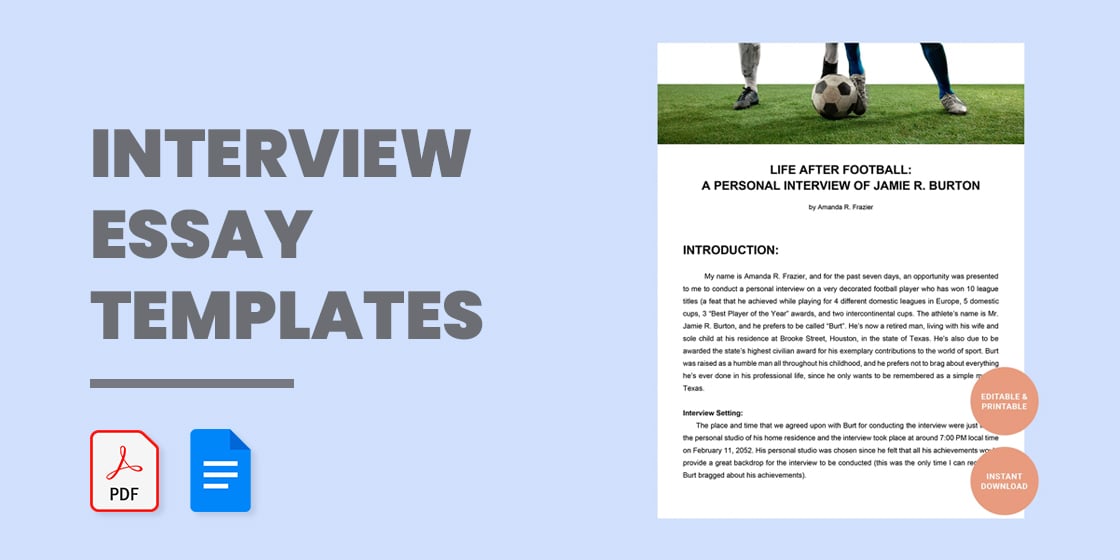
Student Interview Essay Template
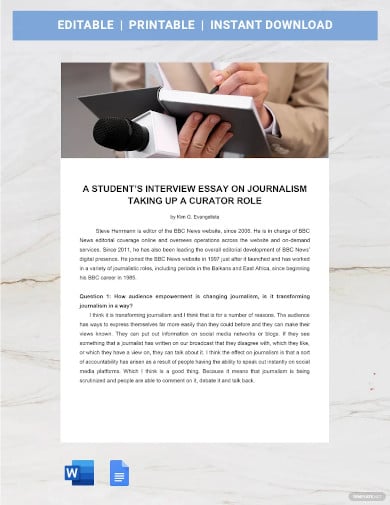
- Google Docs
Family Interview Essay Template
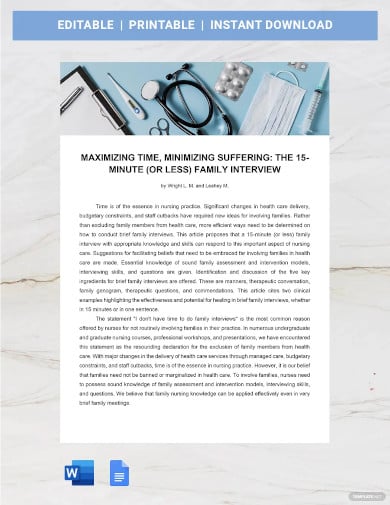
Personal Interview Essay Template
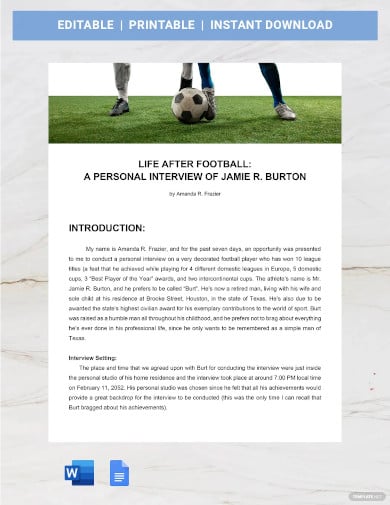
Interview Essay Sample Template
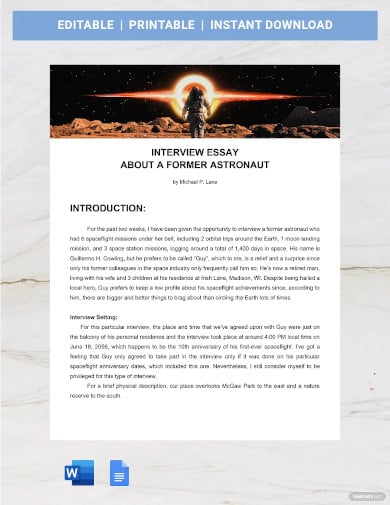
Job Interview Essay Template
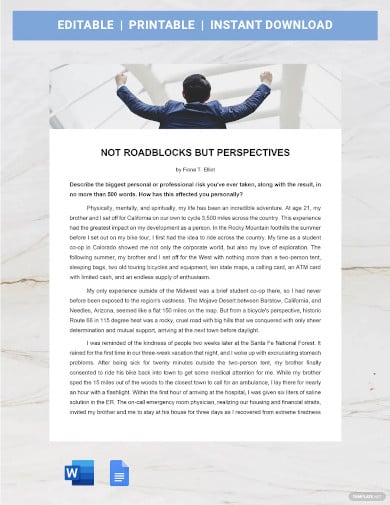
Informational Interview Essay Template
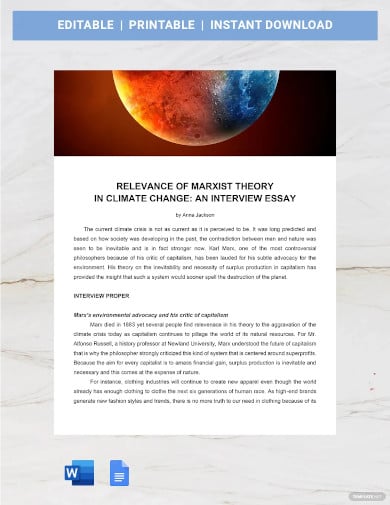
Leadership Interview Essay Template
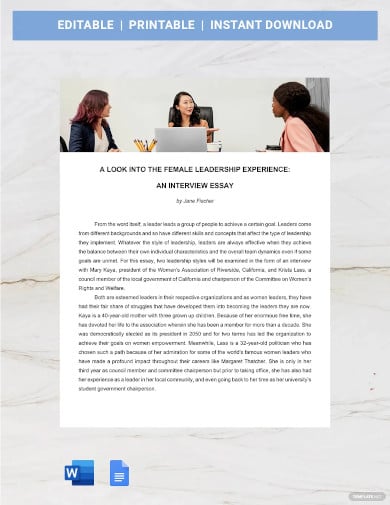
Free Interview Essay Example Template
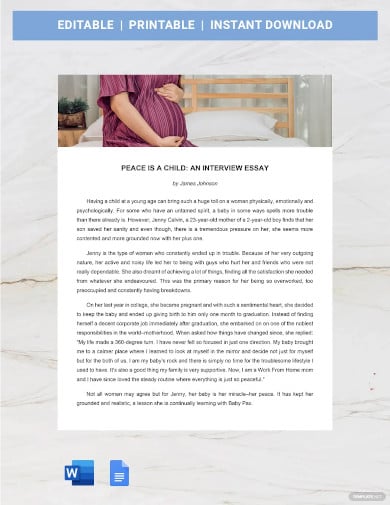
Teacher Interview Essay Template
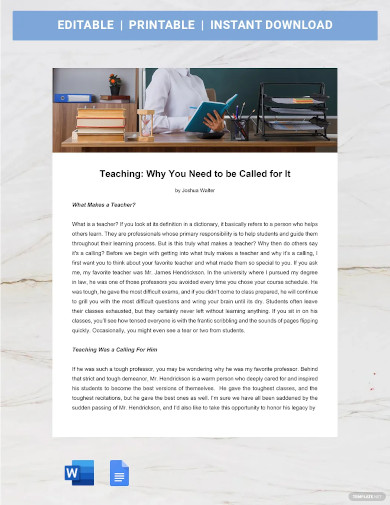
Nursing Interview Essay Template
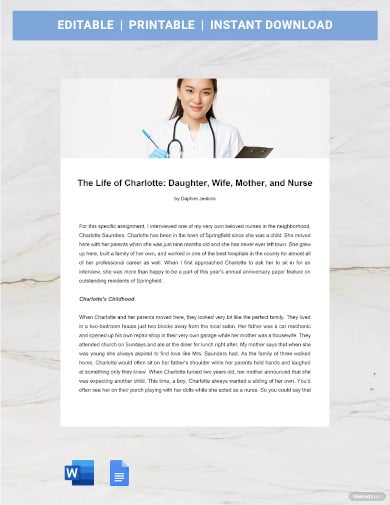
Interview and Writing Essay Assignment
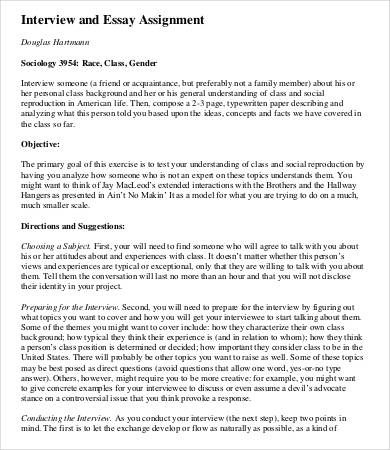
Interview Reflective Paragraph Essay
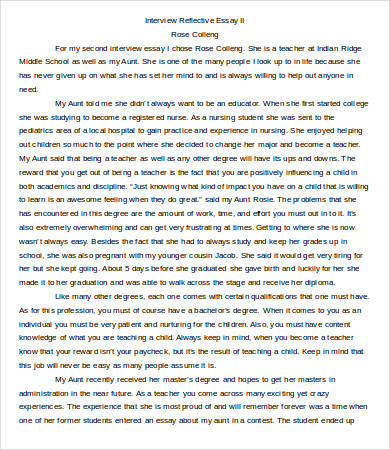
Free High School Interview Essay Sample
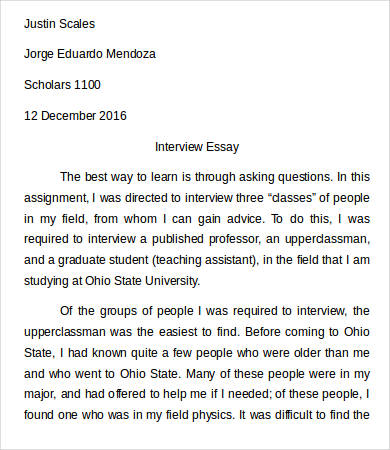
Personal Career Interview Case Study Essay
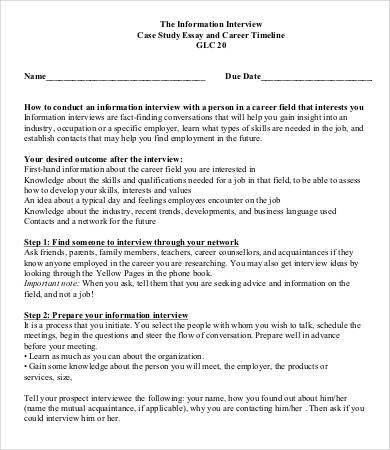
Sample College Narrative Interview Essay
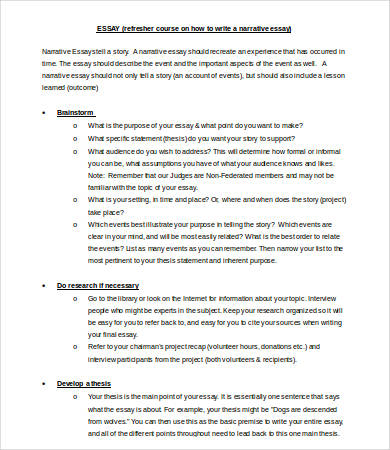
Extended Definition Essay with Interview Paper
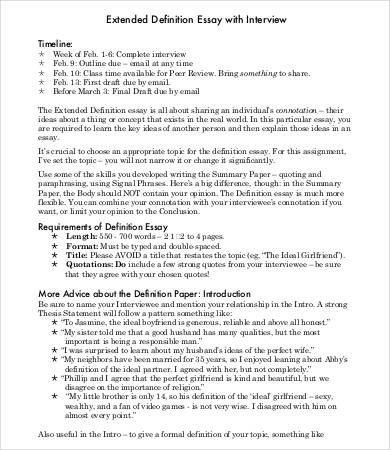
Professional Student Interview Essay Template
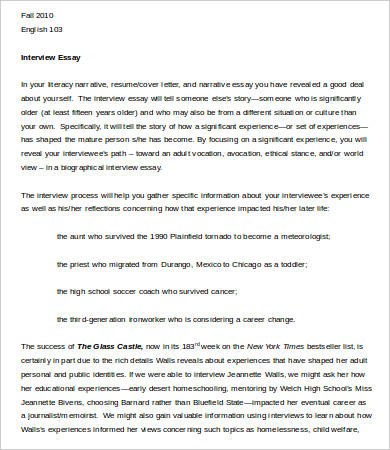
The Process of Creating an Interview Essay
- Think first of the topic that you want to write about. This will serve as your guide on selecting the person that you want to interview.
- Know the purpose of your essay. If you think that interviewing just one person is enough, then it will already do good to Word interview one. It also varies on the mood that you want your writing to have.
- Prepare interview questions. Base your questions on your chosen topic so you can already have a guideline on what to ask. With this, you can already create a structure for your essay as you already have an idea of what is going to be in it. An information Sheet will just vary depending on the answers of your interviewee.
- Quoting your interviewer. If you want to quote the interviewee in some parts of your essay, make sure to write the precise sample statement that he or she has said during the interview. If you cannot write at a fast pace, using an audio-recording device to record the entire interview with the permission of the PDF interviewee is of great help.
- Prepare for the essay. After the interview, construct your thoughts and create a flow of ideas where you can insert the items being answered during the interview.
- Start writing your interview essay and make sure that you are following the pattern that you have created for a cohesive thought pre-construction .
Interview Essays with Journalists and Politicians
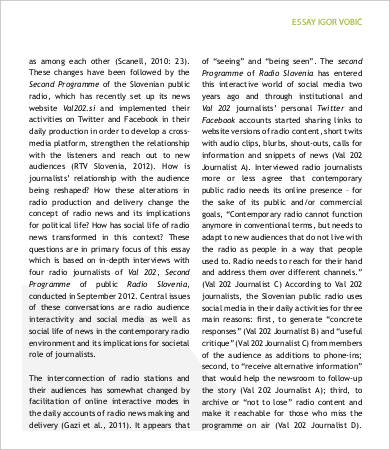
Job Interview Essay Report with Introduction
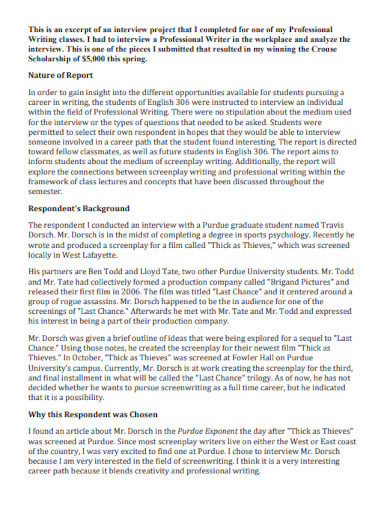
Interview Essay with APA Documentation Style
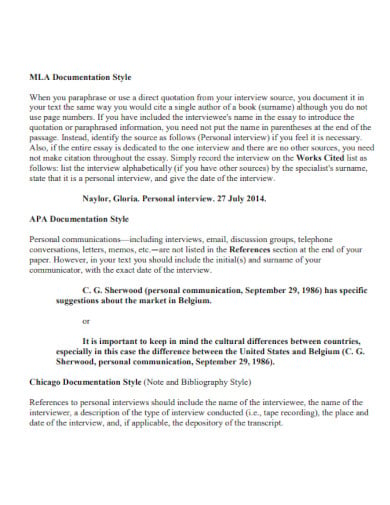
Leadership Interview Reflective Essay
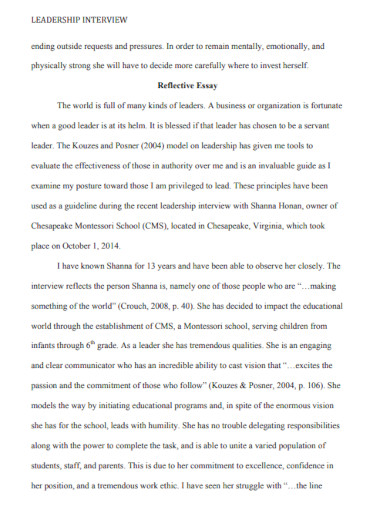
Capture the Attention of Your Readers
More in essay templates, interview essay example, interview article template, interview essay in apa documentation style template, personal career case study interview essay template, job interview essay report with introduction template, reflective interview essay template, reflective leadership interview essay template, high school interview essay template, extended definition essay with interview template.
- How to Make/Create a College Essay [Templates + Examples] 2023
- How to Make/Create a Rhetorical Analysis Essay [Templates + Examples] 2023
- 5+ Free Descriptive Essay Templates – PDF
- 15+ Essay Format Templates – PDF
- 11+ Free Descriptive Essay Templates – PDF, DOC
- 19+ Essay Templates in PDF
- How to Make/Create a Narrative Essay [Templates + Examples] 2023
- 14+ 5 Paragraph Essay Templates – PDF
- How To Make/Create a 5-Paragraph Essay Outline [Templates + Examples] 2023
- 10+ Argumentative Essay Outline Templates – PDF
- 9+ Leadership Essays
- 13+ Literary Essay Templates in Word | Google Docs | Apple Pages | PDF
- 7+ Extended Essay Templates
- 9+ Free Downloadable Informative Essay Samples and Examples
File Formats
Word templates, google docs templates, excel templates, powerpoint templates, google sheets templates, google slides templates, pdf templates, publisher templates, psd templates, indesign templates, illustrator templates, pages templates, keynote templates, numbers templates, outlook templates.
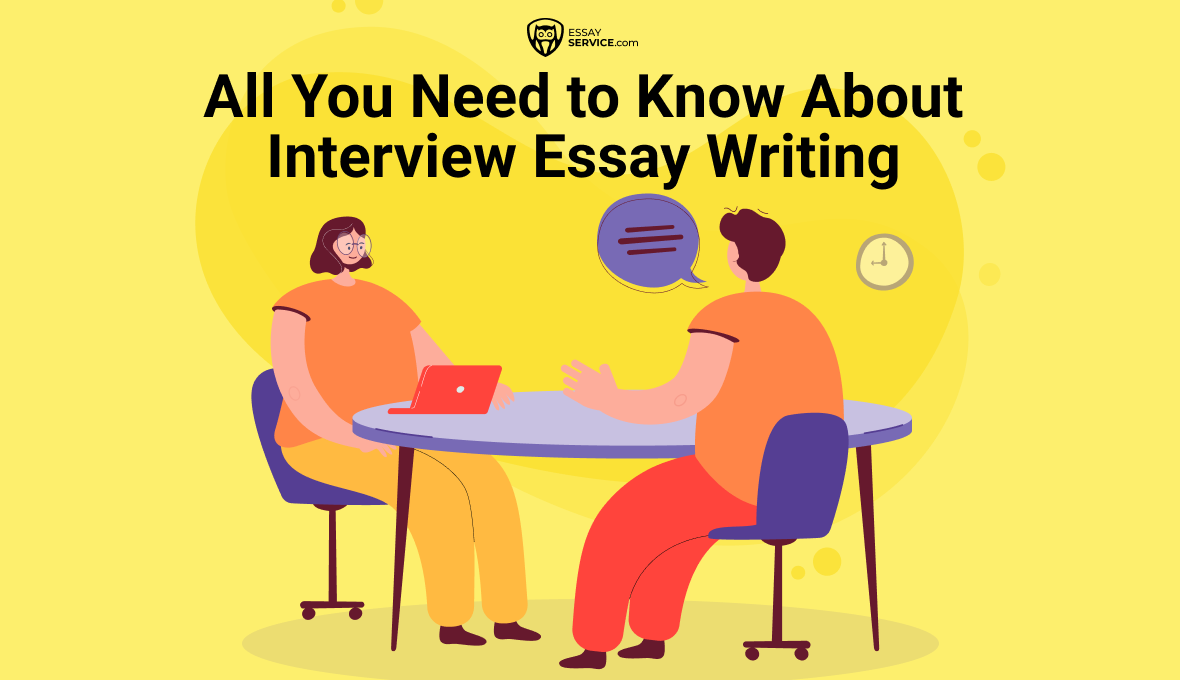
All You Need to Know About Interview Essay Writing

Purpose of Writing an Interview Essay
The writing process is not always smooth sailing. When it comes to the construction of interview papers, you are free to ask about myriads of issues of your interests and get a broad insight from the interview subject. Once you figure out the main thesis statement for your interview essay, you must collect relatable data in question-and-answer format. The gathered information is almost always subjective since the authoritative individuals and qualified experts are your main data providers. Interview essays are constructed based on people's biased opinions rather than books, historical records, and other sources.
Are you looking for answers on how to write an outline for interview essay? We are here to provide you with useful tips on how to write interview APA format essay.
You might as well find this article helpful since we have prepared essay writing in interview sample at the end of it.
Format for Writing an Interview Essay
Are you on the verge of choosing an appropriate format to write an interview essay? One of the essential steps includes identifying the type of interview paper you are willing to write. The interview essay format is determined based on the style of your paper. There are three basic types of interview papers:

- Narrative Essay Interview - Through this type of paper, you are assigned to research a specific topic based on the conducted interview. The main thing is to accumulate all the information that the interviewed person has provided in a neat and organized manner in the form of a narrative. The story might be written from your perspective or that of the interviewee. In that case, you are free to write in the first and second person.
- Personal Interview - Such type of paper demands you to prepare a list of witty interview questions to ask a specific person who holds a certain type of authority based on their professional occupation. The final product turns out to be an interview in essay format.
- Question-answer Interview - Such interview questions are often asked to job seekers. This is your chance to glance through the common interview questions that the hiring managers will ask you to get a glimpse of your personality and career goals. The questions and answers can be combined in an interview paper. For more information, check out internship interview questions and answers here.

How to Write an Outline for Interview Essay
After you have chosen key points for your interview paper and adjusted its format accordingly, you might wonder, 'should I write an outline for an interview essay ?'. The answer is clear and direct - 'Yes, definitely!'
Good writers always prepare an outline in advance, which is a great tip to lift the burden of the time-consuming paper writing process. The basic structure of interview essay outline includes three major parts:

- Introduction - As you state your paper's thesis statement, you can start writing by introducing the person or the people you interviewed.
- Body Paragraphs - The following paragraphs should contain the subjective points of view that your interviewees provided concerning your major thesis statement.
- Conclusion - In the concluding paragraph of the essay, restate the paper's main goal and summarize the most important points you have made so far.
Writing an Interview Essay Introduction
Once you wrap up the interview essay, outline you are ready to start the writing process. Writing a catchy lead and grabbing a reader's attention right away is not a simple task. However, there are some key elements that make up the best of the introduction part of your interview essay. The primary sentence should briefly contain the main objective behind the chosen topic of the paper. The following sentences should report the importance of your essay topic to your target audience. Finally, you can proceed with the thesis statement, which indicates the basic value of your paper. In other words, try to answer the question of what benefits the reader gets from familiarizing themself with your interview paper.
Do not hesitate to ask us to write an essay for me whether you are assigned to construct an interview essay on writing or any other given subject.
Writing an Interview Essay Body Paragraphs
The body paragraphs hold the majority of the essay. Provided paragraphs support the central statement with relatable facts, details, and key points as the answers that an interviewer asks.
Some of the interviewers prefer to use a recording device, while others opt for notes to contain the important data in its entirety. They choose to include parts of the narrative later in the body paragraphs of the essay as they gather the most important and thematic points made throughout the interview process. You might as well include direct quotes or in-text citations as the sources of provided answers. However, always keep in mind to ask for written permission if you plan to paraphrase or directly copy their ideas word by word according to the issue of your interest.
Writing an interview essay can be hard, so if you are looking for further tips on how to write an essay , we can provide you with an interview essay outline example as well as the complete paper itself.
Writing an Interview Essay Conclusion
The classic format for writing an interview essay includes jotting down the main objectives made throughout the paper in a final paragraph, otherwise known as the conclusion. The last paragraph is not any less important compared to the opening one. That is why you should try and restate the crucial points that interviewees have made while answering questions provided by you. That way, you will sound even more persuasive as you provide evident arguments supported by powerful public figures regarded as influential in society.
You are welcome to conclude the essay with a respectful thank you note as well. Express sincere gratification to the reader for taking the time to read your essay and focus on your contribution to them with the source of information contained in the written interview paper.
If you don’t have distinguished skills for writing an outline for college interview essay, our experts have your back! Contact us to write papers for money and enjoy a perfectly-crafted assignment.
Essay Writing Topics in Interview
Looking for inspiration? Researching an interesting topic for the essay can be exhausting sometimes. But we are here to give you a helping hand through tough times. Our experts have gathered some of the most compelling essay writing topics in interview. You are free to take a look at them and choose one that satisfies your curiosity and challenges you to be analyzed in depth.
- Does body language describe our mental state?
- How important is eye contact for establishing genuine connections?
- Are educated and qualified people obliged to give more to others?
- Which job position is the most attractive in the 21st century?
- Do career services help people get to their target job market?
- Does conflict resolution hold an important place in the contemporary world?
- What is love, and where do you feel it or experience it most often?
- How do our family heritage and traditions influence our personalities?
- How many hours of sleep are needed at different stages of life?
- What kind of skills is essential to possess in order to become a good leader?
- Should the tax system be allocated to the rich and poor accordingly?
- Is the two-party system the guarantee of American democracy in the US?
- Should combatting racism be an individual responsibility?
- Should the American people restrict the amount of money spent on the electoral college?
- How do relationships and friendships shape our lives?
- Do your dreams and nightmares reflect real-life events?
- How do you keep yourself from getting sick?
- Does technology make your daily life easier?
- Do you agree or disagree with the idea that opposites attract?
- What does it mean to be a religious and faithful person to you?
We hope those mentioned above, as well as other essay writing topics for interview in google, will fuel your curiosity.
Meanwhile, you can always pay for papers . Our experts are capable of writing an essay for a job interview based on your individual demands that will get you closer to your dream position.
Interview Essay Writing Examples
Here is one of the interview essay writing examples to check out. We hope that the provided example will give you some kind of perspective:
'A LEADER IS ONE WHO KNOWS THE WAY, GOES THE WAY, AND SHOWS THE WAY'
According to the popular idea, leaders are born rather than made. Contrary to this belief, many real-life examples prove that people can grow into a leader type as they grow older if they want to. Any man can be a leader, but it is not an easy thing to do. You need to know yourself to set an example for others, inspire them, and give them a sense of trust to follow your steps. People are inclined toward those who know where they are going, have their own vision, and are educated enough to support their decisions with rational arguments. These traits give leaders the power to be persuasive. They have their goals set and are not afraid to firmly face any challenges that life might throw their way.
To support this statement, we have interviewed a Pakistani female education activist, Malala Yousafzai, who also carries the honor of being the 2014 Nobel Peace Prize laureate. She is a pure example of how one can rise from any kind of social and domestic circumstances if one has a vision and works hard enough to achieve their goals. She realized the value of education from a very young age. The latter was often inaccessible for girls of her nation due to authoritative powers in the head of the government, under which education was banned for almost all the females in the Northern Pakistani region. Malala persistently fought for her truth and raised awareness about the value that educating girls and boys could hold. She began writing articles and her personal insights anonymously to describe the intolerable circumstances that females had to face under the group of dictators, highlighting the purpose of education and its unavailability for girls of Pakistan.
Malala's example is one of a kind. She wants to be remembered as a girl who tries to help others in whatever capacity she can hold. She did everything possible to let the outer world know about the injustice that the government of her nation committed. She never backed down even after the confrontation between her and the representatives of the ruling power at the head of the Pakistani government.
Further Academic Help
We hope you gained some beneficial information throughout this article which will help you craft a top-notch interview essay for your journalism class. In case of further assistance, our expert writers are here to provide you with interview essay examples APA format at our paper service platform.
Before you go, you are welcome to take an essay writing test for interview to check how well you understood the concept of the article and implement gained knowledge into your upcoming assignment.
Frequently asked questions
She was flawless! first time using a website like this, I've ordered article review and i totally adored it! grammar punctuation, content - everything was on point
This writer is my go to, because whenever I need someone who I can trust my task to - I hire Joy. She wrote almost every paper for me for the last 2 years
Term paper done up to a highest standard, no revisions, perfect communication. 10s across the board!!!!!!!
I send him instructions and that's it. my paper was done 10 hours later, no stupid questions, he nailed it.
Sometimes I wonder if Michael is secretly a professor because he literally knows everything. HE DID SO WELL THAT MY PROF SHOWED MY PAPER AS AN EXAMPLE. unbelievable, many thanks
You Might Also Like
.png)
New Posts to Your Inbox!
Stay in touch
Using an interview in a research paper
Consultant contributor: Viviane Ugalde
Using an interview can be an effective primary source for some papers and research projects. Finding an expert in the field or some other person who has knowledge of your topic can allow for you to gather unique information not available elsewhere.
There are four steps to using an interview as a source for your research.
- Know where and how to start.
- Know how to write a good question.
- Know how to conduct an interview.
- Know how to incorporate the interview into your document or project.
Step one: Where to start
First, you should determine your goals and ask yourself these questions:
- Who are the local experts on topic?
- How can I contact these people?
- Does anyone know them to help me setup the interviews?
- Are their phone numbers in the phone book or can I find them on the Internet?
Once you answer these questions and pick your interviewee, get their basic information such as their name, title, and other general details. If you reach out and your interview does not participate, don’t be discouraged. Keep looking for other interview contacts.

Step two: How to write a good question
When you have confirmed an interview, it is not time to come up with questions.
- Learning as much as you can about the person before the interview can help you create questions specific to your interview subject.
- Doing research about your interviewee’s past experience in your topic, or any texts that they have written would be great background research.
When you start to think of questions, write down more questions than you think you’ll need, and prioritize them as you go. Any good questions will answer the 5W and H questions. Asking Who, What, When, Where, Why, and How questions that you need answered for your paper, will help you form a question to ask your interviewee.
When writing a good question, try thinking of something that will help your argument.
- Is your interviewee an advocate for you position?
- Are they in any programs that are related to your research?
- How much experience do they have?
From broad questions like these, you can begin to narrow down to more specific and open-ended questions.
Step three: The interview
If at all possible, arrange to conduct the interview at the subject’s workplace. It will make them more comfortable, and you can write about their surroundings.
- Begin the interview with some small talk in order to give both of you the chance to get comfortable with one another
- Develop rapport that will make the interview easier for both of you.
- Ask open-ended questions
- Keep the conversation moving
- Stay on topic
- The more silence in the room, the more honest the answer.
- If an interesting subject comes up that is related to your research, ask a follow-up or an additional question about it.
- Ask if you can stay in contact with your interview subject in case there are any additional questions you have.
Step four: Incorporating the interview
When picking the material out of your interview, remember that people rarely speak perfectly. There will be many slang words and pauses that you can take out, as long as it does not change the meaning of the material you are using.
As you introduce your interview in the paper, start with a transition such as “according to” or other attributions. You should also be specific to the type of interview you are working with. This way, you will build a stronger ethos in your paper .
The body of your essay should clearly set up the quote or paraphrase you use from the interview responses,. Be careful not to stick a quote from the interview into the body of your essay because it sounds good. When deciding what to quote in your paper, think about what dialogue from the interview would add the most color to your interview. Quotes that illustrate what your interviewer sounded like, or what their personality is are always the best quotes to choose from.
Once you have done that, proofread your essay. Make sure the quotes you used don’t make up the majority of your paper. The interview quotes are supposed to support your argument; you are not supposed to support the interview.
For example, let’s say that you are arguing that free education is better than not. For your argument, you interview a local politician who is on your side of the argument. Rather than using a large quote that explains the stance of both sides, and why the politician chose this side, your quote is there to support the information you’ve already given. Whatever the politician says should prove what you argue, and not give new information.
Step five: Examples of citing your interviews
Smith, Jane. Personal interview. 19 May 2018.
(E. Robbins, personal communication, January 4, 2018).
Smith also claimed that many of her students had difficulties with APA style (personal communication, November 3, 2018).
Reference list
Daly, C. & Leighton W. (2017). Interviewing a Source: Tips. Journalists Resource.
Driscoll, D. (2018 ). Interviewing. Purdue University
Hayden, K. (2012). How to Conduct an Interview to Write a Paper . Bright Hub Education, Bright Hub Inc.
Hose, C. (2017). How to Incorporate Interviews into Essays. Leaf Group Education.
Magnesi, J. (2017). How to Interview Someone for an Article or Research Paper. Career Trend, Leaf group Media.
What are your chances of acceptance?
Calculate for all schools, your chance of acceptance.
Your chancing factors
Extracurriculars.
10 Personal Statement Essay Examples That Worked
What’s covered:, what is a personal statement.
- Essay 1: Summer Program
- Essay 2: Being Bangladeshi-American
- Essay 3: Why Medicine
- Essay 4: Love of Writing
- Essay 5: Starting a Fire
- Essay 6: Dedicating a Track
- Essay 7: Body Image and Eating Disorders
- Essay 8: Becoming a Coach
- Essay 9: Eritrea
- Essay 10: Journaling
- Is Your Personal Statement Strong Enough?
Your personal statement is any essay that you must write for your main application, such as the Common App Essay , University of California Essays , or Coalition Application Essay . This type of essay focuses on your unique experiences, ideas, or beliefs that may not be discussed throughout the rest of your application. This essay should be an opportunity for the admissions officers to get to know you better and give them a glimpse into who you really are.
In this post, we will share 10 different personal statements that were all written by real students. We will also provide commentary on what each essay did well and where there is room for improvement, so you can make your personal statement as strong as possible!
Please note: Looking at examples of real essays students have submitted to colleges can be very beneficial to get inspiration for your essays. You should never copy or plagiarize from these examples when writing your own essays. Colleges can tell when an essay isn’t genuine and will not view students favorably if they plagiarized.
Personal Statement Examples
Essay example #1: exchange program.
The twisting roads, ornate mosaics, and fragrant scent of freshly ground spices had been so foreign at first. Now in my fifth week of the SNYI-L summer exchange program in Morocco, I felt more comfortable in the city. With a bag full of pastries from the market, I navigated to a bus stop, paid the fare, and began the trip back to my host family’s house. It was hard to believe that only a few years earlier my mom was worried about letting me travel around my home city on my own, let alone a place that I had only lived in for a few weeks. While I had been on a journey towards self-sufficiency and independence for a few years now, it was Morocco that pushed me to become the confident, self-reflective person that I am today.
As a child, my parents pressured me to achieve perfect grades, master my swim strokes, and discover interesting hobbies like playing the oboe and learning to pick locks. I felt compelled to live my life according to their wishes. Of course, this pressure was not a wholly negative factor in my life –– you might even call it support. However, the constant presence of my parents’ hopes for me overcame my own sense of desire and led me to become quite dependent on them. I pushed myself to get straight A’s, complied with years of oboe lessons, and dutifully attended hours of swim practice after school. Despite all these achievements, I felt like I had no sense of self beyond my drive for success. I had always been expected to succeed on the path they had defined. However, this path was interrupted seven years after my parents’ divorce when my dad moved across the country to Oregon.
I missed my dad’s close presence, but I loved my new sense of freedom. My parents’ separation allowed me the space to explore my own strengths and interests as each of them became individually busier. As early as middle school, I was riding the light rail train by myself, reading maps to get myself home, and applying to special academic programs without urging from my parents. Even as I took more initiatives on my own, my parents both continued to see me as somewhat immature. All of that changed three years ago, when I applied and was accepted to the SNYI-L summer exchange program in Morocco. I would be studying Arabic and learning my way around the city of Marrakesh. Although I think my parents were a little surprised when I told them my news, the addition of a fully-funded scholarship convinced them to let me go.
I lived with a host family in Marrakesh and learned that they, too, had high expectations for me. I didn’t know a word of Arabic, and although my host parents and one brother spoke good English, they knew I was there to learn. If I messed up, they patiently corrected me but refused to let me fall into the easy pattern of speaking English just as I did at home. Just as I had when I was younger, I felt pressured and stressed about meeting their expectations. However, one day, as I strolled through the bustling market square after successfully bargaining with one of the street vendors, I realized my mistake. My host family wasn’t being unfair by making me fumble through Arabic. I had applied for this trip, and I had committed to the intensive language study. My host family’s rules about speaking Arabic at home had not been to fulfill their expectations for me, but to help me fulfill my expectations for myself. Similarly, the pressure my parents had put on me as a child had come out of love and their hopes for me, not out of a desire to crush my individuality.
As my bus drove through the still-bustling market square and past the medieval Ben-Youssef madrasa, I realized that becoming independent was a process, not an event. I thought that my parents’ separation when I was ten had been the one experience that would transform me into a self-motivated and autonomous person. It did, but that didn’t mean that I didn’t still have room to grow. Now, although I am even more self-sufficient than I was three years ago, I try to approach every experience with the expectation that it will change me. It’s still difficult, but I understand that just because growth can be uncomfortable doesn’t mean it’s not important.
What the Essay Did Well
This is a nice essay because it delves into particular character trait of the student and how it has been shaped and matured over time. Although it doesn’t focus the essay around a specific anecdote, the essay is still successful because it is centered around this student’s independence. This is a nice approach for a personal statement: highlight a particular trait of yours and explore how it has grown with you.
The ideas in this essay are universal to growing up—living up to parents’ expectations, yearning for freedom, and coming to terms with reality—but it feels unique to the student because of the inclusion of details specific to them. Including their oboe lessons, the experience of riding the light rail by themselves, and the negotiations with a street vendor helps show the reader what these common tropes of growing up looked like for them personally.
Another strength of the essay is the level of self-reflection included throughout the piece. Since there is no central anecdote tying everything together, an essay about a character trait is only successful when you deeply reflect on how you felt, where you made mistakes, and how that trait impacts your life. The author includes reflection in sentences like “ I felt like I had no sense of self beyond my drive for success, ” and “ I understand that just because growth can be uncomfortable doesn’t mean it’s not important. ” These sentences help us see how the student was impacted and what their point of view is.
What Could Be Improved
The largest change this essay would benefit from is to show not tell. The platitude you have heard a million times no doubt, but for good reason. This essay heavily relies on telling the reader what occurred, making us less engaged as the entire reading experience feels more passive. If the student had shown us what happens though, it keeps the reader tied to the action and makes them feel like they are there with the student, making it much more enjoyable to read.
For example, they tell us about the pressure to succeed their parents placed on them: “ I pushed myself to get straight A’s, complied with years of oboe lessons, and dutifully attended hours of swim practice after school.” They could have shown us what that pressure looked like with a sentence like this: “ My stomach turned somersaults as my rattling knee thumped against the desk before every test, scared to get anything less than a 95. For five years the painful squawk of the oboe only reminded me of my parents’ claps and whistles at my concerts. I mastered the butterfly, backstroke, and freestyle, fighting against the anchor of their expectations threatening to pull me down.”
If the student had gone through their essay and applied this exercise of bringing more detail and colorful language to sentences that tell the reader what happened, the essay would be really great.
Table of Contents
Essay Example #2: Being Bangladeshi-American
Life before was good: verdant forests, sumptuous curries, and a devoted family.
Then, my family abandoned our comfortable life in Bangladesh for a chance at the American dream in Los Angeles. Within our first year, my father was diagnosed with thyroid cancer. He lost his battle three weeks before my sixth birthday. Facing a new country without the steady presence of my father, we were vulnerable — prisoners of hardship in the land of the free. We resettled in the Bronx, in my uncle’s renovated basement. It was meant to be our refuge, but I felt more displaced than ever. Gone were the high-rise condos of West L.A.; instead, government projects towered over the neighborhood. Pedestrians no longer smiled and greeted me; the atmosphere was hostile, even toxic. Schoolkids were quick to pick on those they saw as weak or foreign, hurling harsh words I’d never heard before.
Meanwhile, my family began integrating into the local Bangladeshi community. I struggled to understand those who shared my heritage. Bangladeshi mothers stayed home while fathers drove cabs and sold fruit by the roadside — painful societal positions. Riding on crosstown buses or walking home from school, I began to internalize these disparities. During my fleeting encounters with affluent Upper East Siders, I saw kids my age with nannies, parents who wore suits to work, and luxurious apartments with spectacular views. Most took cabs to their destinations: cabs that Bangladeshis drove. I watched the mundane moments of their lives with longing, aching to plant myself in their shoes. Shame prickled down my spine. I distanced myself from my heritage, rejecting the traditional panjabis worn on Eid and refusing the torkari we ate for dinner every day.
As I grappled with my relationship with the Bangladeshi community, I turned my attention to helping my Bronx community by pursuing an internship with Assemblyman Luis Sepulveda. I handled desk work and took calls, spending the bulk of my time actively listening to the hardships constituents faced — everything from a veteran stripped of his benefits to a grandmother unable to support her bedridden grandchild.
I’d never exposed myself to stories like these, and now I was the first to hear them. As an intern, I could only assist in what felt like the small ways — pointing out local job offerings, printing information on free ESL classes, reaching out to non-profits. But to a community facing an onslaught of intense struggles, I realized that something as small as these actions could have vast impacts. Seeing the immediate consequences of my actions inspired me. Throughout that summer, I internalized my community’s daily challenges in a new light. I began to stop seeing the prevalent underemployment and cramped living quarters less as sources of shame. Instead, I saw them as realities that had to be acknowledged, but could ultimately be remedied. I also realized the benefits of the Bangladeshi culture I had been so ashamed of. My Bangla language skills were an asset to the office, and my understanding of Bangladeshi etiquette allowed for smooth communication between office staff and its constituents. As I helped my neighbors navigate city services, I saw my heritage with pride — a perspective I never expected to have.
I can now appreciate the value of my unique culture and background, and of living with less. This perspective offers room for progress, community integration, and a future worth fighting for. My time with Assemblyman Sepulveda’s office taught me that I can be a change agent in enabling this progression. Far from being ashamed of my community, I want to someday return to local politics in the Bronx to continue helping others access the American Dream. I hope to help my community appreciate the opportunity to make progress together. By embracing reality, I learned to live it. Along the way, I discovered one thing: life is good, but we can make it better.
This student’s passion for social justice and civic duty shines through in this essay because of how honest it is. Sharing their personal experience with immigrating, moving around, being an outsider, and finding a community allows us to see the hardships this student has faced and builds empathy towards their situation. However, what really makes it strong is that they go beyond describing the difficulties they faced and explain the mental impact it had on them as a child: Shame prickled down my spine. I distanced myself from my heritage, rejecting the traditional panjabis worn on Eid and refusing the torkari we ate for dinner every day.
The rejection of their culture presented at the beginning of the essay creates a nice juxtaposition with the student’s view in the latter half of the essay and helps demonstrate how they have matured. They use their experience interning as a way to delve into a change in their thought process about their culture and show how their passion for social justice began. Using this experience as a mechanism to explore their thoughts and feelings is an excellent example of how items that are included elsewhere on your application should be incorporated into your essay.
This essay prioritizes emotions and personal views over specific anecdotes. Although there are details and certain moments incorporated throughout to emphasize the author’s points, the main focus remains on the student and how they grapple with their culture and identity.
One area for improvement is the conclusion. Although the forward-looking approach is a nice way to end an essay focused on social justice, it would be nice to include more details and imagery in the conclusion. How does the student want to help their community? What government position do they see themselves holding one day?
A more impactful ending might look like the student walking into their office at the New York City Housing Authority in 15 years and looking at the plans to build a new development in the Bronx just blocks away from where the grew up that would provide quality housing to people in their Bangladeshi community. They would smile while thinking about how far they have come from that young kid who used to be ashamed of their culture.
Essay Example #3: Why Medicine
I took my first trip to China to visit my cousin Anna in July of 2014. Distance had kept us apart, but when we were together, we fell into all of our old inside jokes and caught up on each other’s lives. Her sparkling personality and optimistic attitude always brought a smile to my face. This time, however, my heart broke when I saw the effects of her brain cancer; she had suffered from a stroke that paralyzed her left side. She was still herself in many ways, but I could see that the damage to her brain made things difficult for her. I stayed by her every day, providing the support she needed, whether assisting her with eating and drinking, reading to her, or just watching “Friends.” During my flight back home, sorrow and helplessness overwhelmed me. Would I ever see Anna again? Could I have done more to make Anna comfortable? I wished I could stay in China longer to care for her. As I deplaned, I wondered if I could transform my grief to help other children and teenagers in the US who suffered as Anna did.
The day after I got home, as jet lag dragged me awake a few minutes after midnight, I remembered hearing about the Family Reach Foundation (FRF) and its work with children going through treatments at the local hospital and their families. I began volunteering in the FRF’s Children’s Activity Room, where I play with children battling cancer. Volunteering has both made me appreciate my own health and also cherish the new relationships I build with the children and families. We play sports, make figures out of playdoh, and dress up. When they take on the roles of firefighters or fairies, we all get caught up in the game; for that time, they forget the sanitized, stark, impersonal walls of the pediatric oncology ward. Building close relationships with them and seeing them giggle and laugh is so rewarding — I love watching them grow and get better throughout their course of treatment.
Hearing from the parents about their children’s condition and seeing the children recover inspired me to consider medical research. To get started, I enrolled in a summer collegelevel course in Abnormal Psychology. There I worked with Catelyn, a rising college senior, on a data analysis project regarding Dissociative Identity Disorder (DID). Together, we examined the neurological etiology of DID by studying four fMRI and PET cases. I fell in love with gathering data and analyzing the results and was amazed by our final product: several stunning brain images showcasing the areas of hyper and hypoactivity in brains affected by DID. Desire quickly followed my amazement — I want to continue this project and study more brains. Their complexity, delicacy, and importance to every aspect of life fascinate me. Successfully completing this research project gave me a sense of hope; I know I am capable of participating in a large scale research project and potentially making a difference in someone else’s life through my research.
Anna’s diagnosis inspired me to begin volunteering at FRF; from there, I discovered my desire to help people further by contributing to medical research. As my research interest blossomed, I realized that it’s no coincidence that I want to study brains—after all, Anna suffered from brain cancer. Reflecting on these experiences this past year and a half, I see that everything I’ve done is connected. Sadly, a few months after I returned from China, Anna passed away. I am still sad, but as I run a toy truck across the floor and watch one of the little patients’ eyes light up, I imagine that she would be proud of my commitment to pursue medicine and study the brain.
This essay has a very strong emotional core that tugs at the heart strings and makes the reader feel invested. Writing about sickness can be difficult and doesn’t always belong in a personal statement, but in this case it works well because the focus is on how this student cared for her cousin and dealt with the grief and emotions surrounding her condition. Writing about the compassion she showed and the doubts and concerns that filled her mind keeps the focus on the author and her personality.
This continues when she again discusses the activities she did with the kids at FRF and the personal reflection this experience allowed her to have. For example, she writes: Volunteering has both made me appreciate my own health and also cherish the new relationships I build with the children and families. We play sports, make figures out of playdoh, and dress up.
Concluding the essay with the sad story of her cousin’s passing brings the essay full circle and returns to the emotional heart of the piece to once again build a connection with the reader. However, it finishes on a hopeful note and demonstrates how this student has been able to turn a tragic experience into a source of lifelong inspiration.
One thing this essay should be cognizant of is that personal statements should not read as summaries of your extracurricular resume. Although this essay doesn’t fully fall into that trap, it does describe two key extracurriculars the student participated in. However, the inclusion of such a strong emotional core running throughout the essay helps keep the focus on the student and her thoughts and feelings during these activities.
To avoid making this mistake, make sure you have a common thread running through your essay and the extracurriculars provide support to the story you are trying to tell, rather than crafting a story around your activities. And, as this essay does, make sure there is lots of personal reflection and feelings weaved throughout to focus attention to you rather than your extracurriculars.
Essay Example #4: Love of Writing
“I want to be a writer.” This had been my answer to every youthful discussion with the adults in my life about what I would do when I grew up. As early as elementary school, I remember reading my writing pieces aloud to an audience at “Author of the Month” ceremonies. Bearing this goal in mind, and hoping to gain some valuable experience, I signed up for a journalism class during my freshman year. Despite my love for writing, I initially found myself uninterested in the subject and I struggled to enjoy the class. When I thought of writing, I imagined lyrical prose, profound poetry, and thrilling plot lines. Journalism required a laconic style and orderly structure, and I found my teacher’s assignments formulaic and dull. That class shook my confidence as a writer. I was uncertain if I should continue in it for the rest of my high school career.
Despite my misgivings, I decided that I couldn’t make a final decision on whether to quit journalism until I had some experience working for a paper outside of the classroom. The following year, I applied to be a staff reporter on our school newspaper. I hoped this would help me become more self-driven and creative, rather than merely writing articles that my teacher assigned. To my surprise, my time on staff was worlds away from what I experienced in the journalism class. Although I was unaccustomed to working in a fast-paced environment and initially found it burdensome to research and complete high-quality stories in a relatively short amount of time, I also found it exciting. I enjoyed learning more about topics and events on campus that I did not know much about; some of my stories that I covered in my first semester concerned a chess tournament, a food drive, and a Spanish immersion party. I relished in the freedom I had to explore and learn, and to write more independently than I could in a classroom.
Although I enjoyed many aspects of working for the paper immediately, reporting also pushed me outside of my comfort zone. I am a shy person, and speaking with people I did not know intimidated me. During my first interview, I met with the basketball coach to prepare for a story about the team’s winning streak. As I approached his office, I felt everything from my toes to my tongue freeze into a solid block, and I could hardly get out my opening questions. Fortunately, the coach was very kind and helped me through the conversation. Encouraged, I prepared for my next interview with more confidence. After a few weeks of practice, I even started to look forward to interviewing people on campus. That first journalism class may have bored me, but even if journalism in practice was challenging, it was anything but tedious.
Over the course of that year, I grew to love writing for our school newspaper. Reporting made me aware of my surroundings, and made me want to know more about current events on campus and in the town where I grew up. By interacting with people all over campus, I came to understand the breadth of individuals and communities that make up my high school. I felt far more connected to diverse parts of my school through my work as a journalist, and I realized that journalism gave me a window into seeing beyond my own experiences. The style of news writing may be different from what I used to think “writing” meant, but I learned that I can still derive exciting plots from events that may have gone unnoticed if not for my stories. I no longer struggle to approach others, and truly enjoy getting to know people and recognizing their accomplishments through my writing. Becoming a writer may be a difficult path, but it is as rewarding as I hoped when I was young.
This essay is clearly structured in a manner that makes it flow very nicely and contributes to its success. It starts with a quote to draw in the reader and show this student’s life-long passion for writing. Then it addresses the challenges of facing new, unfamiliar territory and how this student overcame it. Finally, it concludes by reflecting on this eye-opening experience and a nod to their younger self from the introduction. Having a well-thought out and sequential structure with clear transitions makes it extremely easy for the reader to follow along and take away the main idea.
Another positive aspect of the essay is the use of strong and expressive language. Sentences like “ When I thought of writing, I imagined lyrical prose, profound poetry, and thrilling plot lines ” stand out because of the intentional use of words like “lyrical”, “profound”, and “thrilling” to convey the student’s love of writing. The author also uses an active voice to capture the readers’ attention and keep us engaged. They rely on their language and diction to reveal details to the reader, for instance saying “ I felt everything from my toes to my tongue freeze into a solid block ” to describe feeling nervous.
This essay is already very strong, so there isn’t much that needs to be changed. One thing that could take the essay from great to outstanding would be to throw in more quotes, internal dialogue, and sensory descriptors.
It would be nice to see the nerves they felt interviewing the coach by including dialogue like “ Um…I want to interview you about…uh…”. They could have shown their original distaste for journalism by narrating the thoughts running through their head. The fast-paced environment of their newspaper could have come to life with descriptions about the clacking of keyboards and the whirl of people running around laying out articles.
Essay Example #5: Starting a Fire
Was I no longer the beloved daughter of nature, whisperer of trees? Knee-high rubber boots, camouflage, bug spray—I wore the garb and perfume of a proud wild woman, yet there I was, hunched over the pathetic pile of stubborn sticks, utterly stumped, on the verge of tears. As a child, I had considered myself a kind of rustic princess, a cradler of spiders and centipedes, who was serenaded by mourning doves and chickadees, who could glide through tick-infested meadows and emerge Lyme-free. I knew the cracks of the earth like the scars on my own rough palms. Yet here I was, ten years later, incapable of performing the most fundamental outdoor task: I could not, for the life of me, start a fire.
Furiously I rubbed the twigs together—rubbed and rubbed until shreds of skin flaked from my fingers. No smoke. The twigs were too young, too sticky-green; I tossed them away with a shower of curses, and began tearing through the underbrush in search of a more flammable collection. My efforts were fruitless. Livid, I bit a rejected twig, determined to prove that the forest had spurned me, offering only young, wet bones that would never burn. But the wood cracked like carrots between my teeth—old, brittle, and bitter. Roaring and nursing my aching palms, I retreated to the tent, where I sulked and awaited the jeers of my family.
Rattling their empty worm cans and reeking of fat fish, my brother and cousins swaggered into the campsite. Immediately, they noticed the minor stick massacre by the fire pit and called to me, their deep voices already sharp with contempt.
“Where’s the fire, Princess Clara?” they taunted. “Having some trouble?” They prodded me with the ends of the chewed branches and, with a few effortless scrapes of wood on rock, sparked a red and roaring flame. My face burned long after I left the fire pit. The camp stank of salmon and shame.
In the tent, I pondered my failure. Was I so dainty? Was I that incapable? I thought of my hands, how calloused and capable they had been, how tender and smooth they had become. It had been years since I’d kneaded mud between my fingers; instead of scaling a white pine, I’d practiced scales on my piano, my hands softening into those of a musician—fleshy and sensitive. And I’d gotten glasses, having grown horrifically nearsighted; long nights of dim lighting and thick books had done this. I couldn’t remember the last time I had lain down on a hill, barefaced, and seen the stars without having to squint. Crawling along the edge of the tent, a spider confirmed my transformation—he disgusted me, and I felt an overwhelming urge to squash him.
Yet, I realized I hadn’t really changed—I had only shifted perspective. I still eagerly explored new worlds, but through poems and prose rather than pastures and puddles. I’d grown to prefer the boom of a bass over that of a bullfrog, learned to coax a different kind of fire from wood, having developed a burn for writing rhymes and scrawling hypotheses.
That night, I stayed up late with my journal and wrote about the spider I had decided not to kill. I had tolerated him just barely, only shrieking when he jumped—it helped to watch him decorate the corners of the tent with his delicate webs, knowing that he couldn’t start fires, either. When the night grew cold and the embers died, my words still smoked—my hands burned from all that scrawling—and even when I fell asleep, the ideas kept sparking—I was on fire, always on fire.
This student is an excellent writer, which allows a simple story to be outstandingly compelling. The author articulates her points beautifully and creatively through her immense use of details and figurative language. Lines like “a rustic princess, a cradler of spiders and centipedes, who was serenaded by mourning doves and chickadees,” and “rubbed and rubbed until shreds of skin flaked from my fingers,” create vivid images that draw the reader in.
The flowery and descriptive prose also contributes to the nice juxtaposition between the old Clara and the new Clara. The latter half of the essay contrasts elements of nature with music and writing to demonstrate how natural these interests are for her now. This sentence perfectly encapsulates the contrast she is trying to build: “It had been years since I’d kneaded mud between my fingers; instead of scaling a white pine, I’d practiced scales on my piano, my hands softening into those of a musician—fleshy and sensitive.”
In addition to being well-written, this essay is thematically cohesive. It begins with the simple introduction “Fire!” and ends with the following image: “When the night grew cold and the embers died, my words still smoked—my hands burned from all that scrawling—and even when I fell asleep, the ideas kept sparking—I was on fire, always on fire.” This full-circle approach leaves readers satisfied and impressed.
There is very little this essay should change, however one thing to be cautious about is having an essay that is overly-descriptive. We know from the essay that this student likes to read and write, and depending on other elements of her application, it might make total sense to have such a flowery and ornate writing style. However, your personal statement needs to reflect your voice as well as your personality. If you would never use language like this in conversation or your writing, don’t put it in your personal statement. Make sure there is a balance between eloquence and your personal voice.
Essay Example #6: Dedicating a Track
“Getting beat is one thing – it’s part of competing – but I want no part in losing.” Coach Rob Stark’s motto never fails to remind me of his encouragement on early-morning bus rides to track meets around the state. I’ve always appreciated the phrase, but an experience last June helped me understand its more profound, universal meaning.
Stark, as we affectionately call him, has coached track at my high school for 25 years. His care, dedication, and emphasis on developing good character has left an enduring impact on me and hundreds of other students. Not only did he help me discover my talent and love for running, but he also taught me the importance of commitment and discipline and to approach every endeavor with the passion and intensity that I bring to running. When I learned a neighboring high school had dedicated their track to a longtime coach, I felt that Stark deserved similar honors.
Our school district’s board of education indicated they would only dedicate our track to Stark if I could demonstrate that he was extraordinary. I took charge and mobilized my teammates to distribute petitions, reach out to alumni, and compile statistics on the many team and individual champions Stark had coached over the years. We received astounding support, collecting almost 3,000 signatures and pages of endorsements from across the community. With help from my teammates, I presented this evidence to the board.
They didn’t bite.
Most members argued that dedicating the track was a low priority. Knowing that we had to act quickly to convince them of its importance, I called a team meeting where we drafted a rebuttal for the next board meeting. To my surprise, they chose me to deliver it. I was far from the best public speaker in the group, and I felt nervous about going before the unsympathetic board again. However, at that second meeting, I discovered that I enjoy articulating and arguing for something that I’m passionate about.
Public speaking resembles a cross country race. Walking to the starting line, you have to trust your training and quell your last minute doubts. When the gun fires, you can’t think too hard about anything; your performance has to be instinctual, natural, even relaxed. At the next board meeting, the podium was my starting line. As I walked up to it, familiar butterflies fluttered in my stomach. Instead of the track stretching out in front of me, I faced the vast audience of teachers, board members, and my teammates. I felt my adrenaline build, and reassured myself: I’ve put in the work, my argument is powerful and sound. As the board president told me to introduce myself, I heard, “runners set” in the back of my mind. She finished speaking, and Bang! The brief silence was the gunshot for me to begin.
The next few minutes blurred together, but when the dust settled, I knew from the board members’ expressions and the audience’s thunderous approval that I had run quite a race. Unfortunately, it wasn’t enough; the board voted down our proposal. I was disappointed, but proud of myself, my team, and our collaboration off the track. We stood up for a cause we believed in, and I overcame my worries about being a leader. Although I discovered that changing the status quo through an elected body can be a painstakingly difficult process and requires perseverance, I learned that I enjoy the challenges this effort offers. Last month, one of the school board members joked that I had become a “regular” – I now often show up to meetings to advocate for a variety of causes, including better environmental practices in cafeterias and safer equipment for athletes.
Just as Stark taught me, I worked passionately to achieve my goal. I may have been beaten when I appealed to the board, but I certainly didn’t lose, and that would have made Stark proud.
This essay effectively conveys this student’s compassion for others, initiative, and determination—all great qualities to exemplify in a personal statement!
Although they rely on telling us a lot of what happened up until the board meeting, the use of running a race (their passion) as a metaphor for public speaking provides a lot of insight into the fear that this student overcame to work towards something bigger than themself. Comparing a podium to the starting line, the audience to the track, and silence to the gunshot is a nice way of demonstrating this student’s passion for cross country running without making that the focus of the story.
The essay does a nice job of coming full circle at the end by explaining what the quote from the beginning meant to them after this experience. Without explicitly saying “ I now know that what Stark actually meant is…” they rely on the strength of their argument above to make it obvious to the reader what it means to get beat but not lose.
One of the biggest areas of improvement in the intro, however, is how the essay tells us Stark’s impact rather than showing us: His care, dedication, and emphasis on developing good character has left an enduring impact on me and hundreds of other students. Not only did he help me discover my talent and love for running, but he also taught me the importance of commitment and discipline and to approach every endeavor with the passion and intensity that I bring to running.
The writer could’ve helped us feel a stronger emotional connection to Stark if they had included examples of Stark’s qualities, rather than explicitly stating them. For example, they could’ve written something like: Stark was the kind of person who would give you gas money if you told him your parents couldn’t afford to pick you up from practice. And he actually did that—several times. At track meets, alumni regularly would come talk to him and tell him how he’d changed their lives. Before Stark, I was ambivalent about running and was on the JV team, but his encouragement motivated me to run longer and harder and eventually make varsity. Because of him, I approach every endeavor with the passion and intensity that I bring to running.
Essay Example #7: Body Image and Eating Disorders
I press the “discover” button on my Instagram app, hoping to find enticing pictures to satisfy my boredom. Scrolling through, I see funny videos and mouth-watering pictures of food. However, one image stops me immediately. A fit teenage girl with a “perfect body” relaxes in a bikini on a beach. Beneath it, I see a slew of flattering comments. I shake with disapproval over the image’s unrealistic quality. However, part of me still wants to have a body like hers so that others will make similar comments to me.
I would like to resolve a silent issue that harms many teenagers and adults: negative self image and low self-esteem in a world where social media shapes how people view each other. When people see the façades others wear to create an “ideal” image, they can develop poor thought patterns rooted in negative self-talk. The constant comparisons to “perfect” others make people feel small. In this new digital age, it is hard to distinguish authentic from artificial representations.
When I was 11, I developed anorexia nervosa. Though I was already thin, I wanted to be skinny like the models that I saw on the magazine covers on the grocery store stands. Little did I know that those models probably also suffered from disorders, and that photoshop erased their flaws. I preferred being underweight to being healthy. No matter how little I ate or how thin I was, I always thought that I was too fat. I became obsessed with the number on the scale and would try to eat the least that I could without my parents urging me to take more. Fortunately, I stopped engaging in anorexic behaviors before middle school. However, my underlying mental habits did not change. The images that had provoked my disorder in the first place were still a constant presence in my life.
By age 15, I was in recovery from anorexia, but suffered from depression. While I used to only compare myself to models, the growth of social media meant I also compared myself to my friends and acquaintances. I felt left out when I saw my friends’ excitement about lake trips they had taken without me. As I scrolled past endless photos of my flawless, thin classmates with hundreds of likes and affirming comments, I felt my jealousy spiral. I wanted to be admired and loved by other people too. However, I felt that I could never be enough. I began to hate the way that I looked, and felt nothing in my life was good enough. I wanted to be called “perfect” and “body goals,” so I tried to only post at certain times of day to maximize my “likes.” When that didn’t work, I started to feel too anxious to post anything at all.
Body image insecurities and social media comparisons affect thousands of people – men, women, children, and adults – every day. I am lucky – after a few months of my destructive social media habits, I came across a video that pointed out the illusory nature of social media; many Instagram posts only show off good things while people hide their flaws. I began going to therapy, and recovered from my depression. To address the problem of self-image and social media, we can all focus on what matters on the inside and not what is on the surface. As an effort to become healthy internally, I started a club at my school to promote clean eating and radiating beauty from within. It has helped me grow in my confidence, and today I’m not afraid to show others my struggles by sharing my experience with eating disorders. Someday, I hope to make this club a national organization to help teenagers and adults across the country. I support the idea of body positivity and embracing difference, not “perfection.” After all, how can we be ourselves if we all look the same?
This essay covers the difficult topics of eating disorders and mental health. If you’re thinking about covering similar topics in your essay, we recommend reading our post Should You Talk About Mental Health in College Essays?
The short answer is that, yes, you can talk about mental health, but it can be risky. If you do go that route, it’s important to focus on what you learned from the experience.
The strength of this essay is the student’s vulnerability, in excerpts such as this: I wanted to be admired and loved by other people too. However, I felt that I could never be enough. I began to hate the way that I looked, and felt nothing in my life was good enough. I wanted to be called “perfect” and “body goals,” so I tried to only post at certain times of day to maximize my “likes.”
The student goes on to share how they recovered from their depression through an eye-opening video and therapy sessions, and they’re now helping others find their self-worth as well. It’s great that this essay looks towards the future and shares the writer’s goals of making their club a national organization; we can see their ambition and compassion.
The main weakness of this essay is that it doesn’t focus enough on their recovery process, which is arguably the most important part. They could’ve told us more about the video they watched or the process of starting their club and the interactions they’ve had with other members. Especially when sharing such a vulnerable topic, there should be vulnerability in the recovery process too. That way, the reader can fully appreciate all that this student has overcome.
Essay Example #8: Becoming a Coach
”Advanced females ages 13 to 14 please proceed to staging with your coaches at this time.” Skittering around the room, eyes wide and pleading, I frantically explained my situation to nearby coaches. The seconds ticked away in my head; every polite refusal increased my desperation.
Despair weighed me down. I sank to my knees as a stream of competitors, coaches, and officials flowed around me. My dojang had no coach, and the tournament rules prohibited me from competing without one.
Although I wanted to remain strong, doubts began to cloud my mind. I could not help wondering: what was the point of perfecting my skills if I would never even compete? The other members of my team, who had found coaches minutes earlier, attempted to comfort me, but I barely heard their words. They couldn’t understand my despair at being left on the outside, and I never wanted them to understand.
Since my first lesson 12 years ago, the members of my dojang have become family. I have watched them grow up, finding my own happiness in theirs. Together, we have honed our kicks, blocks, and strikes. We have pushed one another to aim higher and become better martial artists. Although my dojang had searched for a reliable coach for years, we had not found one. When we attended competitions in the past, my teammates and I had always gotten lucky and found a sympathetic coach. Now, I knew this practice was unsustainable. It would devastate me to see the other members of my dojang in my situation, unable to compete and losing hope as a result. My dojang needed a coach, and I decided it was up to me to find one.
I first approached the adults in the dojang – both instructors and members’ parents. However, these attempts only reacquainted me with polite refusals. Everyone I asked told me they couldn’t devote multiple weekends per year to competitions. I soon realized that I would have become the coach myself.
At first, the inner workings of tournaments were a mystery to me. To prepare myself for success as a coach, I spent the next year as an official and took coaching classes on the side. I learned everything from motivational strategies to technical, behind-the-scenes components of Taekwondo competitions. Though I emerged with new knowledge and confidence in my capabilities, others did not share this faith.
Parents threw me disbelieving looks when they learned that their children’s coach was only a child herself. My self-confidence was my armor, deflecting their surly glances. Every armor is penetrable, however, and as the relentless barrage of doubts pounded my resilience, it began to wear down. I grew unsure of my own abilities.
Despite the attack, I refused to give up. When I saw the shining eyes of the youngest students preparing for their first competition, I knew I couldn’t let them down. To quit would be to set them up to be barred from competing like I was. The knowledge that I could solve my dojang’s longtime problem motivated me to overcome my apprehension.
Now that my dojang flourishes at competitions, the attacks on me have weakened, but not ended. I may never win the approval of every parent; at times, I am still tormented by doubts, but I find solace in the fact that members of my dojang now only worry about competing to the best of their abilities.
Now, as I arrive at a tournament with my students, I close my eyes and remember the past. I visualize the frantic search for a coach and the chaos amongst my teammates as we competed with one another to find coaches before the staging calls for our respective divisions. I open my eyes to the exact opposite scene. Lacking a coach hurt my ability to compete, but I am proud to know that no member of my dojang will have to face that problem again.
This essay begins with an in-the-moment narrative that really illustrates the chaos of looking for a coach last-minute. We feel the writer’s emotions, particularly her dejectedness, at not being able to compete. Starting an essay in media res is a great way to capture the attention of your readers and build anticipation for what comes next.
Through this essay, we can see how gutsy and determined the student is in deciding to become a coach themselves. She shows us these characteristics through their actions, rather than explicitly telling us: To prepare myself for success as a coach, I spent the next year as an official and took coaching classes on the side. Also, by discussing the opposition she faced and how it affected her, the student is open and vulnerable about the reality of the situation.
The essay comes full circle as the author recalls the frantic situations in seeking out a coach, but this is no longer a concern for them and their team. Overall, this essay is extremely effective in painting this student as mature, bold, and compassionate.
The biggest thing this essay needs to work on is showing not telling. Throughout the essay, the student tells us that she “emerged with new knowledge and confidence,” she “grew unsure of her own abilities,” and she “refused to give up”. What we really want to know is what this looks like.
Instead of saying she “emerged with new knowledge and confidence” she should have shared how she taught a new move to a fellow team-member without hesitation. Rather than telling us she “grew unsure of her own abilities” she should have shown what that looked like by including her internal dialogue and rhetorical questions that ran through her mind. She could have demonstrated what “refusing to give up” looks like by explaining how she kept learning coaching techniques on her own, turned to a mentor for advice, or devised a plan to win over the trust of parents.
Essay Example #9: Eritrea
No one knows where Eritrea is.
On the first day of school, for the past nine years, I would pensively stand in front of a class, a teacher, a stranger waiting for the inevitable question: Where are you from?
I smile politely, my dimples accentuating my ambiguous features. “Eritrea,” I answer promptly and proudly. But I am always prepared. Before their expression can deepen into confusion, ready to ask “where is that,” I elaborate, perhaps with a fleeting hint of exasperation, “East Africa, near Ethiopia.”
Sometimes, I single out the key-shaped hermit nation on a map, stunning teachers who have “never had a student from there!” Grinning, I resist the urge to remark, “You didn’t even know it existed until two minutes ago!”
Eritrea is to the East of Ethiopia, its arid coastline clutches the lucrative Red Sea. Battle scars litter the ancient streets – the colonial Italian architecture lathered with bullet holes, the mosques mangled with mortar shells. Originally part of the world’s first Christian kingdom, Eritrea passed through the hands of colonial Italy, Britain, and Ethiopia for over a century, until a bloody thirty year war of Independence liberated us.
But these are facts that anyone can know with a quick Google search. These are facts that I have memorised and compounded, first from my Grandmother and now from pristine books borrowed from the library.
No historical narrative, however, can adequately capture what Eritrea is. No one knows the aroma of bushels of potatoes, tomatoes, and garlic – still covered in dirt – that leads you to the open-air market. No one knows the poignant scent of spices, arranged in orange piles reminiscent of compacted dunes. No one knows how to haggle stubborn herders for sheep and roosters for Christmas celebrations as deliberately as my mother. No one can replicate the perfect balance of spices in dorho and tsebhi as well as my grandmother, her gnarly hands stirring the pot with ancient precision (chastising my clumsy knife work with the potatoes). It’s impossible to learn when the injera is ready – the exact moment you have to lift the lid of the mogogo. Do it too early (or too late) and the flatbread becomes mangled and gross. It is a sixth sense passed through matriarchal lineages.
There are no sources that catalogue the scent of incense that wafts through the sunlit porch on St. Michael’s; no films that can capture the luminescence of hundreds of flaming bonfires that fluoresce the sidewalks on Kudus Yohannes, as excited children chant Ge’ez proverbs whose origin has been lost to time. You cannot learn the familiarity of walking beneath the towering Gothic figure of the Enda Mariam Cathedral, the crowds undulating to the ringing of the archaic bells. I have memorized the sound of the rains hounding the metal roof during kiremti , the heat of the sun pounding against the Toyota’s window as we sped down towards Ghinda , the opulent brilliance of the stars twinkling in a sky untainted by light pollution, the scent of warm rolls of bani wafting through the streets at precisely 6 o’clock each day…
I fill my flimsy sketchbook with pictures from my memory. My hand remembers the shapes of the hibiscus drifting in the wind, the outline of my grandmother (affectionately nicknamed a’abaye ) leaning over the garden, the bizarre architecture of the Fiat Tagliero . I dice the vegetables with movements handed down from generations. My nose remembers the scent of frying garlic, the sourness of the warm tayta , the sharpness of the mit’mt’a …
This knowledge is intrinsic. “I am Eritrean,” I repeat. “I am proud.” Within me is an encyclopedia of history, culture, and idealism.
Eritrea is the coffee made from scratch, the spices drying in the sun, the priests and nuns. Eritrea is wise, filled with ambition, and unseen potential. Eritrea isn’t a place, it’s an identity.
This is an exceptional essay that provides a window into this student’s culture that really makes their love for their country and heritage leap off the page. The sheer level of details and sensory descriptors this student is able to fit in this space makes the essay stand out. From the smells, to the traditions, sounds, and sights, the author encapsulates all the glory of Eritrea for the reader.
The vivid images this student is able to create for the reader, whether it is having the tedious conversation with every teacher or cooking in their grandmother’s kitchen, transports us into the story and makes us feel like we are there in the moment with the student. This is a prime example of an essay that shows , not tells.
Besides the amazing imagery, the use of shorter paragraphs also contributes to how engaging this essay is. Employing this tactic helps break up the text to make it more readable and it isolates ideas so they stick out more than if they were enveloped in a large paragraph.
Overall, this is a really strong essay that brings to life this student’s heritage through its use of vivid imagery. This essay exemplifies what it means to show not tell in your writing, and it is a great example of how you can write an intimate personal statement without making yourself the primary focus of your essay.
There is very little this essay should improve upon, but one thing the student might consider would be to inject more personal reflection into their response. Although we can clearly take away their deep love and passion for their homeland and culture, the essay would be a bit more personal if they included the emotions and feelings they associate with the various aspects of Eritrea. For example, the way their heart swells with pride when their grandmother praises their ability to cook a flatbread or the feeling of serenity when they hear the bells ring out from the cathedral. Including personal details as well as sensory ones would create a wonderful balance of imagery and reflection.
Essay Example #10: Journaling
Flipping past dozens of colorful entries in my journal, I arrive at the final blank sheet. I press my pen lightly to the page, barely scratching its surface to create a series of loops stringing together into sentences. Emotions spill out, and with their release, I feel lightness in my chest. The stream of thoughts slows as I reach the bottom of the page, and I gently close the cover of the worn book: another journal finished.
I add the journal to the stack of eleven books on my nightstand. Struck by the bittersweet sensation of closing a chapter of my life, I grab the notebook at the bottom of the pile to reminisce.
“I want to make a flying mushen to fly in space and your in it” – October 2008
Pulling back the cover of my first Tinkerbell-themed diary, the prompt “My Hopes and Dreams” captures my attention. Though “machine” is misspelled in my scribbled response, I see the beginnings of my past obsession with outer space. At the age of five, I tore through novels about the solar system, experimented with rockets built from plastic straws, and rented Space Shuttle films from Blockbuster to satisfy my curiosities. While I chased down answers to questions as limitless as the universe, I fell in love with learning. Eight journals later, the same relentless curiosity brought me to an airplane descending on San Francisco Bay.
“I wish I had infinite sunsets” – July 2019
I reach for the charcoal notepad near the top of the pile and open to the first page: my flight to the Stanford Pre-Collegiate Summer Institutes. While I was excited to explore bioengineering, anxiety twisted in my stomach as I imagined my destination, unsure of whether I could overcome my shyness and connect with others.
With each new conversation, the sweat on my palms became less noticeable, and I met students from 23 different countries. Many of the moments where I challenged myself socially revolved around the third story deck of the Jerry house. A strange medley of English, Arabic, and Mandarin filled the summer air as my friends and I gathered there every evening, and dialogues at sunset soon became moments of bliss. In our conversations about cultural differences, the possibility of an afterlife, and the plausibility of far-fetched conspiracy theories, I learned to voice my opinion. As I was introduced to different viewpoints, these moments challenged my understanding of the world around me. In my final entries from California, I find excitement to learn from others and increased confidence, a tool that would later allow me to impact my community.
“The beauty in a tower of cans” – June 2020
Returning my gaze to the stack of journals, I stretch to take the floral-patterned book sitting on top. I flip through, eventually finding the beginnings of the organization I created during the outbreak of COVID-19. Since then, Door-to-Door Deliveries has woven its way through my entries and into reality, allowing me to aid high-risk populations through free grocery delivery.
With the confidence I gained the summer before, I took action when seeing others in need rather than letting my shyness hold me back. I reached out to local churches and senior centers to spread word of our services and interacted with customers through our website and social media pages. To further expand our impact, we held two food drives, and I mustered the courage to ask for donations door-to-door. In a tower of canned donations, I saw the value of reaching out to help others and realized my own potential to impact the world around me.
I delicately close the journal in my hands, smiling softly as the memories reappear, one after another. Reaching under my bed, I pull out a fresh notebook and open to its first sheet. I lightly press my pen to the page, “And so begins the next chapter…”
The structuring of this essay makes it easy and enjoyable to read. The student effectively organizes their various life experiences around their tower of journals, which centers the reader and makes the different stories easy to follow. Additionally, the student engages quotes from their journals—and unique formatting of the quotes—to signal that they are moving in time and show us which memory we should follow them to.
Thematically, the student uses the idea of shyness to connect the different memories they draw out of their journals. As the student describes their experiences overcoming shyness at the Stanford Pre-Collegiate Summer Institutes and Door-to-Door Deliveries, this essay can be read as an Overcoming Obstacles essay.
At the end of this essay, readers are fully convinced that this student is dedicated (they have committed to journaling every day), thoughtful (journaling is a thoughtful process and, in the essay, the student reflects thoughtfully on the past), and motivated (they flew across the country for a summer program and started a business). These are definitely qualities admissions officers are looking for in applicants!
Although this essay is already exceptionally strong as it’s written, the first journal entry feels out of place compared to the other two entries that discuss the author’s shyness and determination. It works well for the essay to have an entry from when the student was younger to add some humor (with misspelled words) and nostalgia, but if the student had either connected the quote they chose to the idea of overcoming a fear present in the other two anecdotes or if they had picked a different quote all together related to their shyness, it would have made the entire essay feel more cohesive.
Where to Get Your Personal Statement Edited
Do you want feedback on your personal statement? After rereading your essays countless times, it can be difficult to evaluate your writing objectively. That’s why we created our free Peer Essay Review tool , where you can get a free review of your essay from another student. You can also improve your own writing skills by reviewing other students’ essays.
If you want a college admissions expert to review your essay, advisors on CollegeVine have helped students refine their writing and submit successful applications to top schools. Find the right advisor for you to improve your chances of getting into your dream school!
Next Step: Supplemental Essays
Essay Guides for Each School
How to Write a Stellar Extracurricular Activity College Essay
4 Tips for Writing a Diversity College Essay
How to Write the “Why This College” Essay
Related CollegeVine Blog Posts

- ALL PREPARATION PDFs
Interview Essay Examples What You Should Know Before Your Day
– Interview Essay Examples –
Are you planning to write an interview essay? Well, these kinds of essays can really benefit you no matter what field of work you plan to pursue after graduation. In this article, we have helped you highlighted some of the successful interview essay examples available.
Never underestimate the role of an interview in your life! It does not matter whether you need to prepare an interview essay to enter the target college or get a job.
It is critical to observe every possibility to make your work the best.
What Is an Interview Essay?
Interview essays are typically based on research gathered from personal testimonies. This could be based on one’s personal experiences or their own input on a given matter.
Informative essay , descriptive essay , or even persuasive essays , depending on the questions asked by the interviewer.
An interview essay is a form of writing that relays the information being gathered through a sample interview. It is done to make the readers knowledgeable of the items discussed during the interview process.
This type of essay allows the writer to relay his or her impressions on the sample interview that occurred and the precise data from the interview.
The content of the essay may include direct quotes from the interview or it may come in a written narrative form. Through this, we are able to gain additional information from a particular perspective.
How to Write an Interview Essay
An interview essay format is a piece of important information to discuss.
The text of this type is formatted according to the existing academic writing standards ( MLA referencing style , APA, Chicago, etc.). Dedicate enough time to studying different writing styles not to fail this mission.
Also, pay attention to the way you quote the person. Mind how you create a list of references on the Bibliography page. A proper interview essay format is part of the grading rubric, so do not underestimate its value!
It is impossible to write a good paper without having a plan meaning an organized essay outline. The structure is standardized: go through the points highlighted below;
1. Introductory paragraph
It is time to think about a great hook sentence to attract the reader’s attention from the first line. Search for the best hook sentence to open your paper, either a; anecdote/joke, metaphor , quote, statistics, etc.
The way you start your interview essay predetermines whether the reading audience will make it to the end.
The thesis statement is an integral part of good academic writing. It contains the most critical information on your topic.
Write down the name of the interviewed person, his/her title or social status, and explain in brief why you believe it is the best candidate for your written story. What & why are you trying to tell about the selected person to the world?
2. Body paragraphs
The structure of any five-paragraph essay is identical. The body paragraphs must contain an important piece of information reflected in the paragraph’s main argument, its first sentence.
Involve a minimum of three main ideas of your written work. This information should sound like the lessons you would like to share with your target reading audience. Stress why the interviewed person is worth listening to.
3. Conclusion
The last paragraph is the paper’s conclusion, which contains a summary of the main arguments as well as several remarks/feedback on the person and specific interview.
Sometimes, it seems difficult to make a story out of the interview. It is time to learn how to write an interview essay (introduction, body, and conclusion) by contacting one of the best paper writing services on the list of academic companies.
Interview Essay Examples
Several types of interview papers exist; we will cover five of the most popular types of this essay.
1. Narrative Interview Essay
To do a narrative writing out of the interview, it is important to change the dialogue into the first-person/third-person speech. Document history & social/cultural issues by taking notes during the interview.
A professional writer can switch a typical dialogue into a “tasty” narrative interview essay to hold the interest of the target audience. Follow these simple steps to obtain a great result:
➢ Conduct research to decide on the questions
➢ Provide a speech transcription
➢ Edit your transcript into a first-person story
Teachers recommend having a 500-word narrative interview paper; watch the number of words in your transcript. In the end, you must have a transcript of questions along with the draft.
Narrative interview essay examples list includes “The life and childhood of Mister ________,” “Things her mom told her,” “Upbringing in the family of 7 children,” “Her successful marriage,” etc.
2. Career Interview Essay
The best way you can help a job applicant to obtain the offer is to make a career interview essay out of the questions-answers style. If you write a story instead of a regular resume & cover letter, it would be original. There are several important questions, which help to gather the necessary information:
➢ What is special about the job applicant/college applicant and how does this person perceive the surrounding world?
➢ Is there any special knowledge, skills, or educational background that makes the person stand out from the pool of candidates?
➢ List personal goals, time period, qualities, location, social status, and other things describing the person.
Are you a potential student? If you plan to work on a great college entrance essay, one of the best ways to help yourself is by listing the answers to these questions in the form of a career interview paper.
Career interview essay examples are “Why I am the best candidate for ______ position,” “What my career goals are,” “My achievements in the field of __________,” etc.
College Entrance Paper
Such writing has a lot in common with the career interview: a candidate should write about his/her life values, beliefs, goals, skills, knowledge, and experience.
The only difference is the applicant tries to impress a college/university committee instead of trying to get a job. Essay writing for an interview is a common thing in college.
The example might be “Why my personal values correspond to the mission of Harvard University.”
Leadership Essay
That is a great way to start a leadership essay explaining different forms of leadership and sharing valuable information on how to become a leader. Make a list of questions. Base it on what professional journalists use to ask when speaking to celebrities or famous business authorities.
Read different leadership tests & their interpretations: such materials are full of valuable information. You can grab some useful questions from the previous job interviews/surveys.
Leadership interview essay examples contain “How Steve Jobs became the richest,” “Alexander the Great who conquered the world” (write an essay based on imaginary interview), “CEO of my company,” “How I managed to turn a PM in two weeks,” etc. “A leader is one who knows the way, goes the way, and shows the way” John C. Maxwell
Personal Interview
Essay writing for an interview requires a face-to-face conversation in a calm, silent environment with the chosen object. The essay based on the questions & answers from the personal interview should not contain any research or writer’s thoughts.
It is about revealing the contacted person to the world the way you see him/her after your conversation. Make sure the essay has words that support your belief regarding the person’s superiority. Try asking a person you don’t like to answer your questions. Who knows if you will change your mind?
Personal interview essay examples list contains any content based on the notes taken during the interview of any type.
Download PDF – Interview Essay Examples
If you have any other questions regarding Interview Essay Examples you can leave your comments below at the box provided below.
Also, do well to share this link with all your friends and loved ones. That is on all your social media platforms.
Comments are closed.
RECENT POST
- The Technology Behind Online Casinos: Ensuring Fair Play and Security
- Terra (LUNA): Stablecoins and DeFi Built on Bitcoin’s Foundation
- High-Tech Trading: The Revolutionary Impact of Advanced Cryptocurrencies in Oil Markets
- Diving Deep into Ocean Protocol: A Comprehensive OCEAN Guide
- Discovering Bitcoin: A Guide for the Unacquainted
- Exploring the World of Online Slot Tournaments: How to Compete and Win
- Opportunities and Strategies: Digital Yuan in the World of Mobile Payments
- The Rhythm of the Reels: Exploring Music Genres in Slot Game Design
- Unhealthy Relationship Selfish Parents Quotes
- What are Some Empowering Quotes from Pride and Prejudice?
- What are the Quotes about Fear of the Unknown?
- Heart Touching Good Morning Love Quotes
- FUTA Recruitment 2024/2025 Application Form & Updates
- Through Thick and Thin Quotes for Courage
- Hurting Quotes on Relationship
- Crescent University Recruitment 2024/2025 Application Form & Updates
- Trust Quotes for Relationships
- Grand Lead Heritage Recruitment 2024/2025 Application Form & Updates
- What are the Quotes About People Being Fake?
- What are the Quotes from the Movie “O Brother Where Art Thou”?
- Advertise Here
- Privacy Policy
Currentschoolnews.com complies with the Digital Millennium Copyright Act and takes prompt action to remove infringing material upon receiving valid takedown notices. We respect intellectual property rights and expect our users to do the same.

Don't miss this opportunity
Enter Your Details

Personal Essay
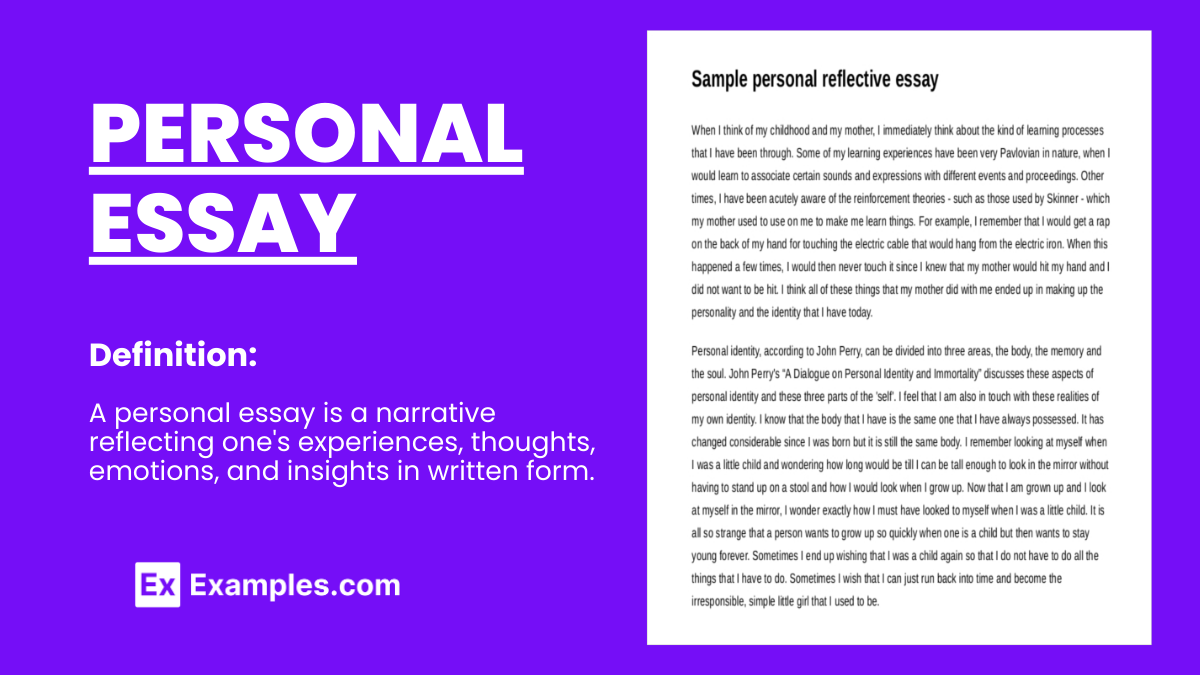
Essay writing are compositions which basically includes a general idea or an in depth discussion of a particular subjects or topics. They are commonly written as non-fictional pieces which carry the writer’s point of view on a certain topic of his/her choice or interest.
In schools, teachers often assign students how to write an essay composition about different topics, usually in order to assess their writing skills. There are different essay types, which can be written using the standard structure (introduction, body, and conclusion), and through different writing styles.
What Is a Personal Essay? A personal essay, in the broadest sense, is a written composition which contains information and personal opinions about a specific individual (usually famous and influential individuals). It is one of the most common essays given as an assignment to students of different levels. In some cases, a personal essay (at times known as a personal statement ) may include the writer’s personal information, as a requirement for an application. They may be used as basis whether to grant an individual’s application or not.
Personal Essay Format
Introduction.
Hook : Begin with a compelling sentence to grab the reader’s attention. This could be an intriguing question, a surprising fact, or a bold statement related to your story. Background Information : Provide some context to your story. This might include the setting, the circumstances leading up to your narrative, or key characters involved. Thesis Statement : Conclude the introduction with a clear thesis statement that presents the main theme or lesson of your essay.
Body Paragraphs
Each paragraph should focus on a single idea that supports your thesis. Use the following structure for each body paragraph:
Topic Sentence : Start with a sentence that introduces the main idea of the paragraph. Evidence and Examples : Use personal experiences, anecdotes, or reflections to support your point. Be descriptive to help the reader visualize and feel your experiences. Analysis : Explain how these examples support your thesis. Connect your personal story to larger themes or universal truths. Transition : End with a sentence that smoothly transitions to the next paragraph.
Summary : Begin your conclusion by restating your thesis in a new way, summarizing the key points you made in your essay. Reflection : Share what you’ve learned from your experiences. Reflect on the growth or change that occurred as a result. Closing Thought : End with a final thought or call to action that leaves a lasting impression on the reader. This could be a question, a prediction, a hope, or a call to personal reflection.
Example of Personal Essay
My Journey Through Silence: Finding My Voice It was in the quietest moments that I discovered the loudest parts of myself. Growing up with a stutter, I navigated a world that often felt like it was designed for everyone but me. Conversations were minefields, and every word was a battle. Yet, it was through this journey of silence and struggle that I found my true voice, not just as a speaker, but as a person with something valuable to say. My stutter was more than a speech impediment; it was a barrier to my identity. In school, I avoided speaking at all costs. Presentations were nightmares, and group discussions were silent movies in which I played the mute protagonist. This silence, however, became my loudest cry for self-expression. I turned to writing, where words flowed unimpeded. Writing became my refuge, but it also set the stage for a greater transformation. The turning point came when I was asked to write a speech for a community event. Faced with the daunting task of not only writing but delivering it, I felt the familiar cloak of fear. But the message I wanted to share was louder than my fears. Standing on that stage, stuttering yet undeterred, I realized my voice’s power didn’t come from its fluency but from the truth it carried. That moment marked the beginning of a new chapter in my life. The journey from silence to expression taught me the value of listening. I learned to listen not only to the words of others but to the unspoken messages in their pauses, their breaths, and their eyes. This deepened empathy and understanding fueled my desire to advocate for those who, like me, struggled to be heard. My personal battle had evolved into a broader mission. My stutter, once a source of shame, became my greatest teacher. It taught me the power of perseverance, the art of listening, and the value of voice. I’ve learned that our imperfections are not limitations but invitations to find unique paths to self-expression. In finding my voice, I discovered that the most profound conversations often start in silence. And it is in embracing our vulnerabilities that we find our true strength. This journey of overcoming, learning, and ultimately embracing my stutter has not only shaped my identity but has also shown me the universal power of resilience and the beauty of human connection through vulnerability.
Personal Essay for Students
Embracing Change: My First Year in High School Starting high school was a monumental change in my life. It was a blend of excitement and anxiety, stepping into a world that seemed so vast and unknown. I had always heard that high school was where you found yourself, where lifelong friendships were formed, and where the future started to take shape. My journey through the first year of high school taught me about adaptability, resilience, and discovering my own path. The summer before high school, I oscillated between dreaming about the independence it would bring and fearing the challenges of new academic pressures and social dynamics. The thought of navigating a larger school with students from different backgrounds and the pressure to perform well academically loomed large. Yet, there was this underlying current of excitement about joining clubs, exploring new subjects, and the chance to redefine myself. The first day was a whirlwind of emotions. The hallways were bustling with students, and the air was thick with anticipation. I remember feeling like a small fish in a big pond, surrounded by unfamiliar faces and the daunting task of finding my classrooms. It was overwhelming, but there was a sense of adventure in not knowing what each day would bring. Adapting to the academic rigor of high school was challenging. The workload was heavier, and the expectations were higher than I was accustomed to. I learned the hard way that procrastination was my enemy. Balancing homework, extracurricular activities, and personal time became a juggling act. It was during these times that I discovered the importance of time management and setting priorities. I also learned to ask for help when I needed it, whether it was from teachers or classmates, which was a humbling and educational experience in itself. Socially, high school was a maze. Finding where I fit in was not immediate or easy. I joined clubs and sports teams to meet people with similar interests, which helped me form friendships. Some of these friendships fizzled out, while others grew stronger, teaching me about the qualities I valued in friendships and in myself. It was a time of self-discovery, of figuring out my interests, beliefs, and values. One of the most significant lessons from my first year was learning to embrace change. Change was constant, whether it was adapting to new teachers’ styles, the evolving dynamics of friendships, or my own personal growth. I learned that change wasn’t something to fear but to embrace as an opportunity for growth. It taught me resilience, the ability to bounce back from setbacks and to keep moving forward, even when things didn’t go as planned. Reflecting on my first year of high school, I realize it was a year of growth, challenges, and invaluable lessons. It was the beginning of understanding who I am and who I want to become. High school is a journey of transformation, and my first year laid the foundation for the rest of my high school experience. It taught me that while change is inevitable, how I respond to it is within my control. This realization has empowered me to face the future with optimism and an open heart, ready for whatever comes my way.
Personal Essay about Yourself
A Tapestry of Memories: My Story Life, in its essence, is a collection of moments, each thread in the tapestry of our existence weaving a unique story. My story is one of resilience, curiosity, and the relentless pursuit of passion, marked by moments of triumph and trials that have shaped me into who I am today. Born into a family that valued education and hard work above all, I was taught from a young age that the pursuit of knowledge was not just a journey but a responsibility. My childhood was filled with books and the encouragement to question, explore, and dream. This instilled in me a deep-seated love for learning, whether it was understanding the mechanics behind a toy car or unraveling the mysteries of the stars. My parents, my first and forever teachers, nurtured this curiosity, teaching me that every question had an answer and every problem a solution. However, life has its way of testing our mettle. During my teenage years, I faced a significant health challenge that threatened to derail my academic and personal life. Days in the hospital and long periods of recovery became my routine, turning my world upside down. This period was a crucible, testing my resilience and forcing me to find strength I never knew I had. It was a stark reminder of the fragility of life but also a powerful lesson in perseverance. I learned to adapt, to find joy in the smallest of victories, and to keep moving forward, even when the path was obscured by uncertainty. My passion for learning transformed into a love for writing as I navigated through these trials. Writing became my solace, a way to express the whirlwind of emotions and to document my journey through recovery. It was through this medium that I discovered my voice and the power of storytelling. Writing allowed me to step outside my circumstances and to see my story as part of a larger narrative of hope and resilience. It became a catalyst for my recovery, offering a sense of purpose and direction. As I emerged from this challenging chapter, my perspective on life had irrevocably changed. I realized that our experiences, both good and bad, are not just isolated incidents but stepping stones in our journey of personal growth. This realization fueled my desire to make a difference, to use my experiences and my voice to inspire others facing their own battles. Today, I stand as a testament to the power of resilience, the importance of curiosity, and the strength found in vulnerability. My journey has taught me that while we cannot control every aspect of our lives, we can choose how we respond to the challenges we face. I have chosen to face mine with optimism, courage, and an unwavering commitment to growth. In sharing my story, I hope to light a spark in others, to encourage them to embrace their own journeys with courage and to remind them that they are not alone in their struggles. Life is an intricate tapestry of memories, and each of us has a unique story to tell. My story is one of countless threads in the vast tapestry of human experience, a reminder that our stories, in all their complexity and beauty, are what truly make us who we are.
Personal Essay Ideas & Topics with Samples to Edit & Download
- How do you handle fear
- My best friend essay
- The impact of family traditions
- A place you try to avoid
- An event that changed your life
- Childhood memories
- Describe a person you admire
- Had a Dream Come True
- How do you make hard decisions
- The best moment of your life
- What is a book you love
- Your bravest moment
- A row with my peers
- What makes you proud
Personal Essay Examples & Templates
Personal narrative essay template.
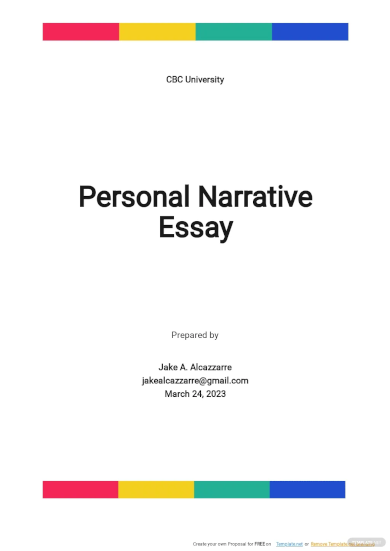
Personal Interview Essay Template
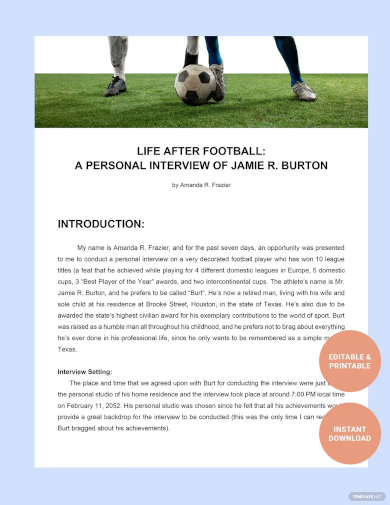
Personal Reflective Essay Template
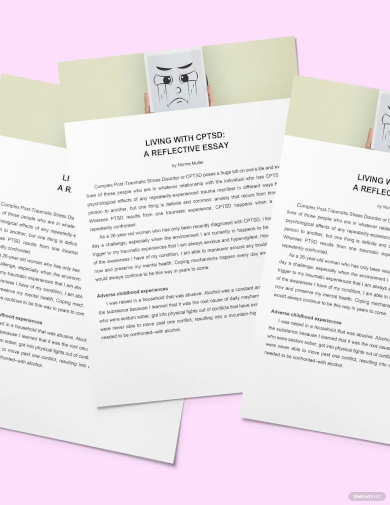
Scholarship Personal Sample
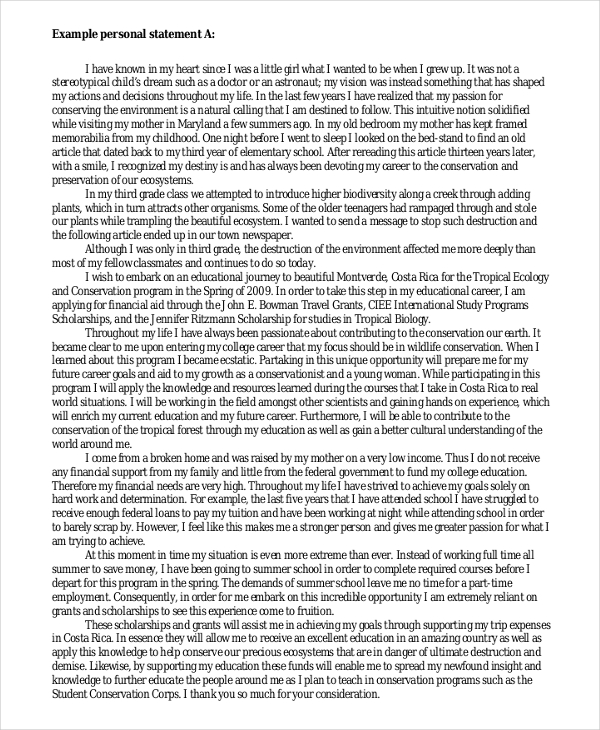
studyabroad.wisc.edu
Personal Narrative
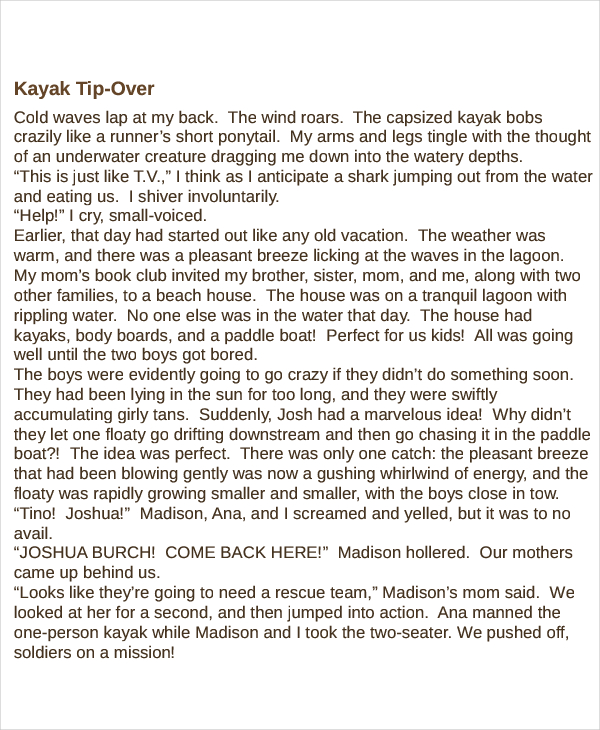
msmcclure.com
Nursing Essay Example
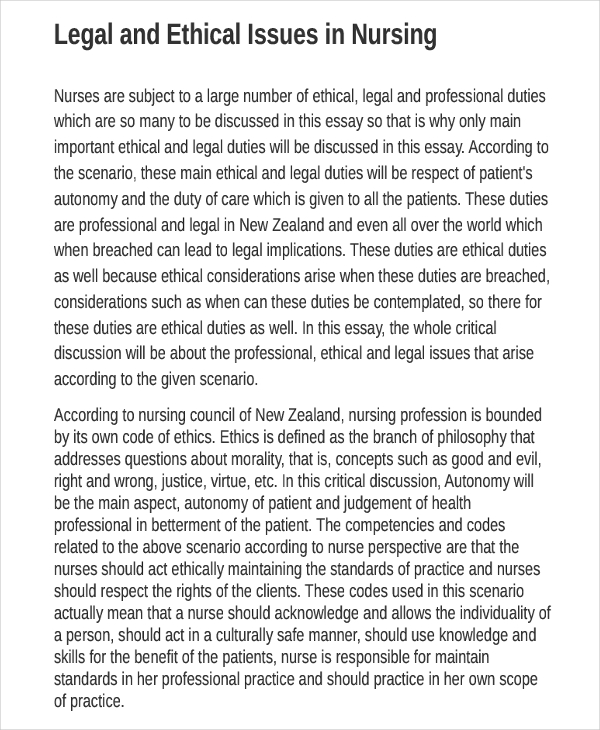
ukessays.com
Personal Descriptive
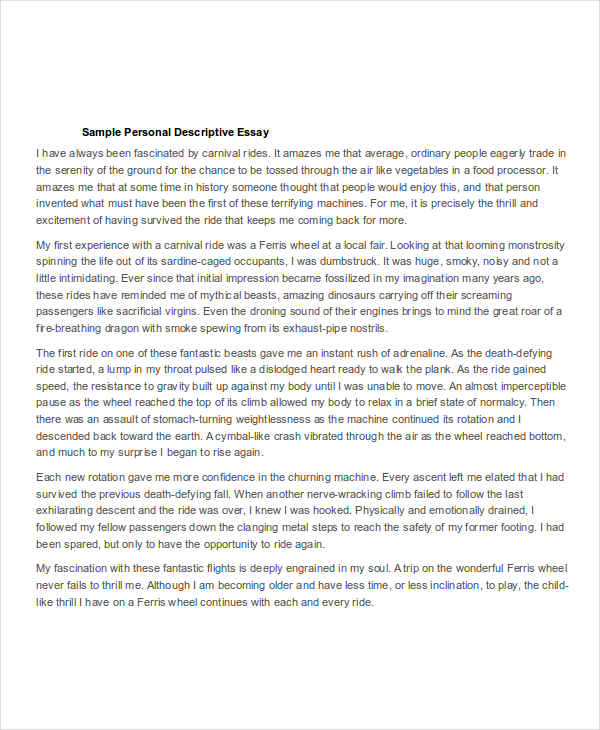
factmonster.com
Personal Reflective Example
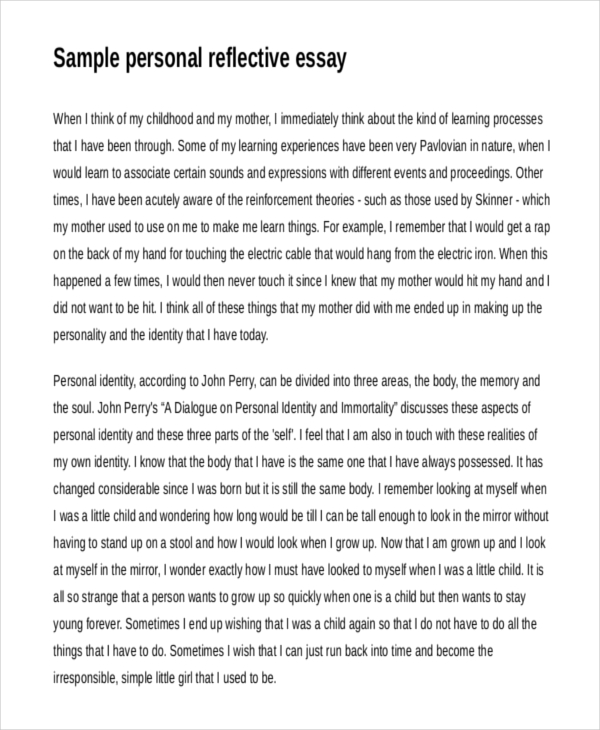
tailoredessays.com
Short Personal Essay
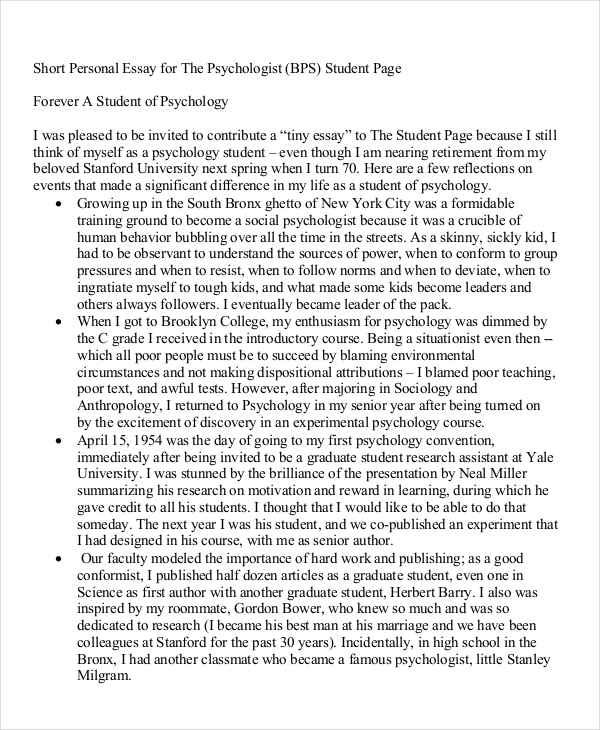
zimbardo.com
Personal Experience
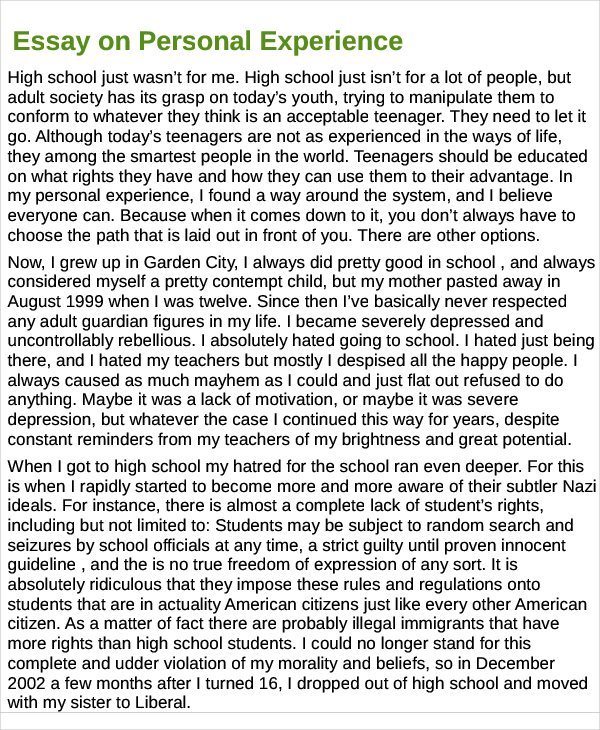
essaylib.com
Statement Essay Sample
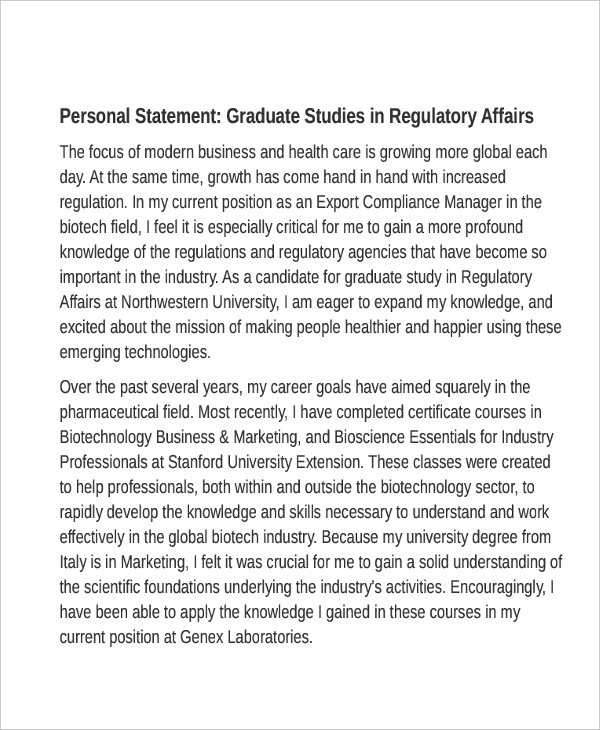
ibabbleon.com
Importance of a Personal Essay
Essays, in general, covers different topics. A personal essay may discuss about prominent people or the writer himself/herself. Like other essays, a personal essay is basically written to inform the readers. You may also see tips for writing an effective essay .
Writing a conclusion for essay helps a writer practice the expression of personal opinion. It also helps in improving the writer’s skill in communicating with the readers. Because a personal essay is a mixture of facts and opinions on a particular matter, the readers may be able to learn about such topic while at the same time learning about the writer’s opinion.
In an application writing , a personal essay can help an individual inform the admission committee about his/her qualifications for a certain job or school admission.
How to Write Personal Essay
Writing a personal essay is a journey into your own experiences, emotions, and insights. It’s an opportunity to share your story, reflect on your life’s events, and express your unique perspective. Here’s a comprehensive guide to crafting a compelling personal essay.
1. Choose Your Topic
- Reflect on Your Experiences : Think about moments in your life that have shaped who you are. These can be milestones, challenges, triumphs, or even everyday occurrences that hold special meaning.
- Identify Your Message : Determine the insight or message you want to convey through your story. What do you want the reader to learn or feel?
2. Create an Outline
- Introduction : Start with a hook to grab the reader’s attention, followed by a brief overview of the story you will tell. Conclude with a thesis statement that encapsulates the main theme of your essay.
- Body Paragraphs : Outline each paragraph with a main idea that supports your thesis. Include specific details, experiences, and reflections.
- Conclusion : Plan to tie your narrative together, restate your thesis in a new light, and leave the reader with something to think about.
3. Write with Authenticity and Emotion
- Be Honest : Authenticity resonates with readers. Share your true thoughts, feelings, and experiences.
- Show, Don’t Tell : Use descriptive language to show the reader what happened and how it affected you. Include sensory details to bring your story to life.
4. Structure Your Essay
- Introduction : Begin with an engaging hook. Provide background information and introduce the central theme or question of your essay.
- Body Paragraphs : Each paragraph should focus on a specific event or aspect of your story. Use transitions to smoothly connect ideas and maintain flow.
- Conclusion : Reflect on the story and its implications. Highlight how the experiences have shaped you or changed your perspective.
5. Edit and Revise
- Take a Break : After writing your first draft, take some time away from it. This will help you return with a fresh perspective.
- Read Aloud : Reading your essay out loud can help you catch awkward phrasing and grammatical errors.
- Seek Feedback : Share your essay with trusted friends or mentors. Constructive feedback can offer new insights and help improve your writing.
- Revise : Focus on clarity, coherence, and conciseness. Ensure each sentence serves a purpose and supports your thesis.
6. Pay Attention to the Details
- Follow Guidelines : If you’re writing for a specific purpose (like a college application), make sure to follow any given instructions or word limits.
- Check Grammar and Spelling : Use tools or have someone proofread your essay to catch any mistakes.
7. Reflect on Your Growth
A personal essay is not just about recounting events; it’s about showing how those events have led to personal growth or a change in perspective. Reflect on what you’ve learned and how you’ve changed.
8. Conclusion
Writing a personal essay is an opportunity to delve into your own story and share it with the world. It requires introspection, honesty, and a willingness to be vulnerable. By following these steps, you can craft an essay that not only tells your story but also touches the hearts and minds of your readers. Remember, the most powerful essays come from a place of truth and a desire to communicate genuinely.
What are the Essential Elements of Personal Essay
1. a clear theme or thesis.
- Every personal essay should have a central theme or thesis that guides the narrative. This theme is the essay’s underlying message or insight that you wish to convey to your readers. It should be evident throughout the essay, providing coherence and unity to your story.
2. A Strong Opening
- The opening of your essay should immediately engage the reader. It can be a provocative question, a striking anecdote, a vivid description, or an intriguing statement. The goal is to pique the reader’s interest and set the tone for the rest of the essay.
3. Personal Experience and Anecdotes
- The heart of a personal essay lies in the author’s experiences. Detailed anecdotes and personal stories not only make the essay relatable but also help to illustrate the essay’s main theme. These narratives should be vivid, descriptive, and emotive, allowing readers to see through the author’s eyes.
4. Authentic Voice
- A personal essay should reflect the unique voice and personality of the author. It’s an opportunity to express yourself in a personal and intimate manner. Your voice should be consistent throughout the essay, giving readers a sense of who you are.
5. Reflective Insight
- Beyond narrating events, a personal essay should delve into what these experiences mean to the author. It involves analyzing events, drawing lessons, and reflecting on the impact these have had on your life or perspective. This reflective insight differentiates a personal essay from mere storytelling.
6. Emotional Resonance
- Emotional resonance helps to connect with the reader on a deeper level. By sharing feelings, vulnerabilities, and personal struggles, you invite the reader into your world. The ability to evoke empathy or emotional response is a powerful tool in personal essays.
7. A Thoughtful Conclusion
- The conclusion of a personal essay should not only wrap up the narrative but also leave the reader with something to ponder. It could be a reflection on the journey, insights gained, or questions raised by the essay. A strong conclusion reinforces the essay’s theme and echoes the emotional or intellectual impact of your story.
8. Clear, Concise Language
- While personal essays are expressive, they also benefit from clear, concise language. Avoid overly complex sentences or unnecessary jargon. The goal is to communicate your story and insights in an accessible and engaging manner.
9. Craftsmanship in Writing
- Attention to the craft of writing—such as the use of vivid imagery, metaphorical language, and a well-structured narrative—can significantly enhance the impact of a personal essay. It’s not just what you say but how you say it that matters.
Tips and Guidelines in Writing a Personal Essay
A personal essay can be written for different purposes. An effectively written personal essay has the ability to inform the readers, while at the same time, inspiring them. In writing a personal essay (or essay examples in doc ), a writer must keep the following things in mind.
1. Pick a topic.
Choose a topic that is both timely and significant in your area. Your life story can also be considered as a great topic in writing your personal essay. You may also see personal essay examples & samples.
2. Determine the focus.
You cannot cover everything, so find an angle which you can focus on.
3. Know the purpose.
See if you can satisfy your purpose in writing your composition.
4. Create an outline.
Essay Outlines provide a better division and organization of ideas. This gives the writer a direction on what to focus on.
5. Write the draft.
With a draft, you will be able to write without hesitations or restrictions.
6. Provide the facts.
Research on the topic you want to write about and provide the facts. You may also like samples of formal essays .
7. Share your opinions.
Share what you think about the topic.
8. Be consistent.
Remain focused on your topic throughout your whole composition.
9. Write simply and briefly.
Using simple language will enable you to explain your topic clearly, at the same time helping you to effectively shorten your sentences and paragraph. You may also check out analytical essay examples & samples.
10. Edit your essay.
Improve your short essay by rechecking and reviewing for errors.

Personal Essay Generator
Text prompt
- Instructive
- Professional
Write a Personal Essay on a life-changing experience.
Discuss a moment of failure and what you learned from it in your Personal Essay.
- Business Templates
- Sample Essays
FREE 12+ Interview Essay Samples in MS Word | PDF
Interview essay example, sample essay - 15+ documents in pdf, scholarship essay example - 9+ samples in word, pdf, descriptive essay example - 6+ samples in pdf.
It is a word that inspire dread in the hearts of many students, especially when the purpose of their essay is not just to get a good mark but to impress a bunch of academic authorities. The difficulty of essay writing expands tenfold when what relies on how well you write your essay is no longer just an A in a report card but the opportunity of a lifetime. Whether this opportunity is getting into the college of your dreams or getting a coveted scholarship, don’t let it slip through your fingers.
Download our Essay Samples and see the essay-writing guidelines we have included.
Personal Interview Essay Template

- Google Docs
Nursing Interview Essay Template

Leadership Interview Essay Template

Teacher Interview Essay Template

Student Interview Essay Template

Sample Interview Narrative Essay Template
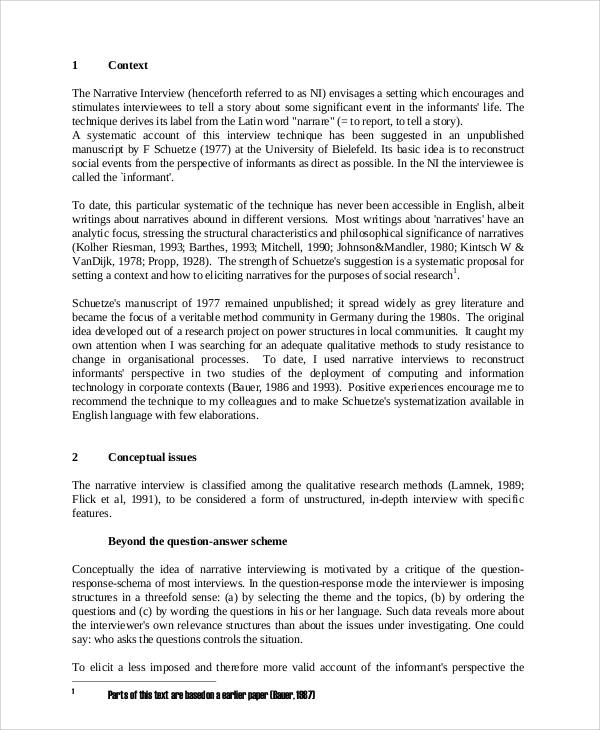
Job Interview Essay Template
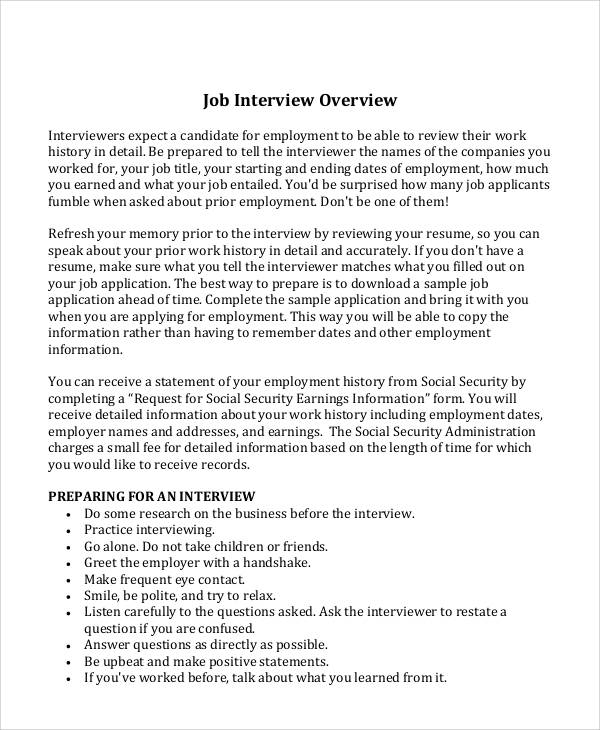
Size: 342KB
Interview Report Essay DOC
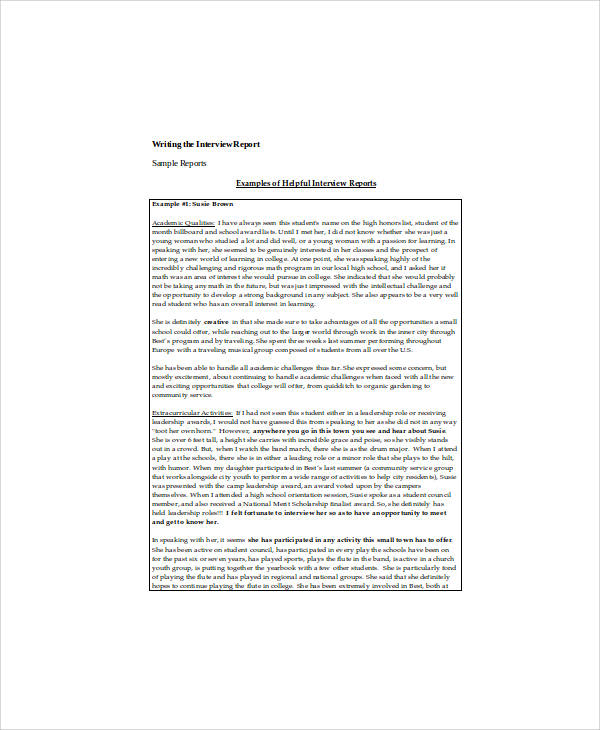
Informational Interview Essay Template
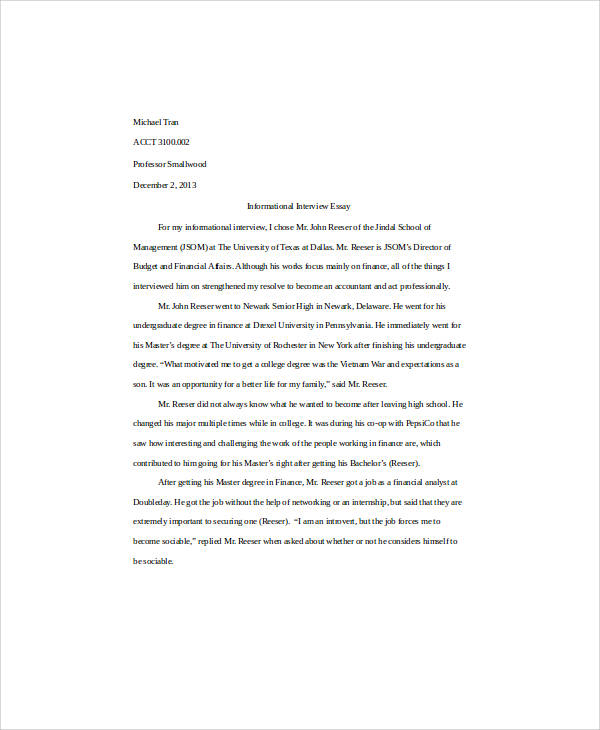
Admission and Scholarship Essays
When you are writing an essay in hopes of gaining a scholarship or admission to a school, you are not writing to impress the deciding body with your academic know-how. They require these essays to gauge the skills you might possess, to get to know your personality and characteristics you possess, whether you’d fit in with the culture of the organization, and whether or not your values are in line with theirs.
For a more in-depth guide in writing essays relating to school admission and scholarships, see our Sample College Essays and Sample Scholarship Essays .
Narrative Essays
Essays written to accompany an application or in the hope of gaining admission to an organization are most appropriately written as a narrative. Many times, writing a narrative essay has been likened to telling a story. Both are required to have the same elements: a plot, characters, a climax, and a conclusion. Because narrative essays are classified to be nonfictional pieces, they are often based on experience—often the author’s but sometimes someone else’s. In other words, when writing a narrative essay, you cannot just make things up as you go. Most importantly, a narrative essay should have something to share: an idea, a realization, a thought, or a lesson. It should portray growth, change, and learning.
Professional Interview Essay Format
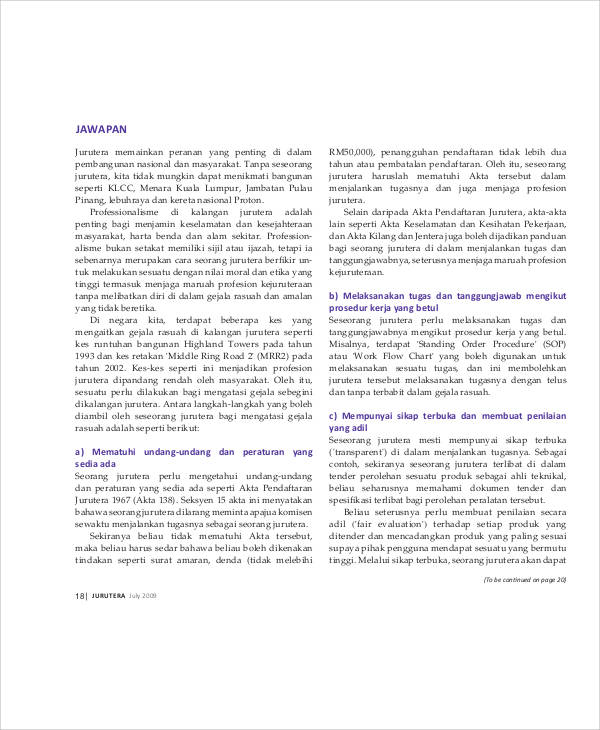
Size: 496KB
Sample College Admission Interview Essay Template
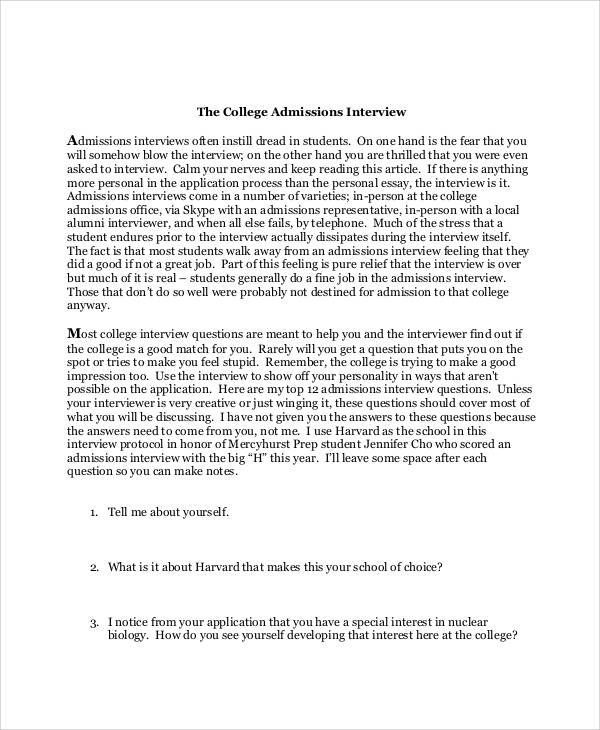
Interview Research Essay Template
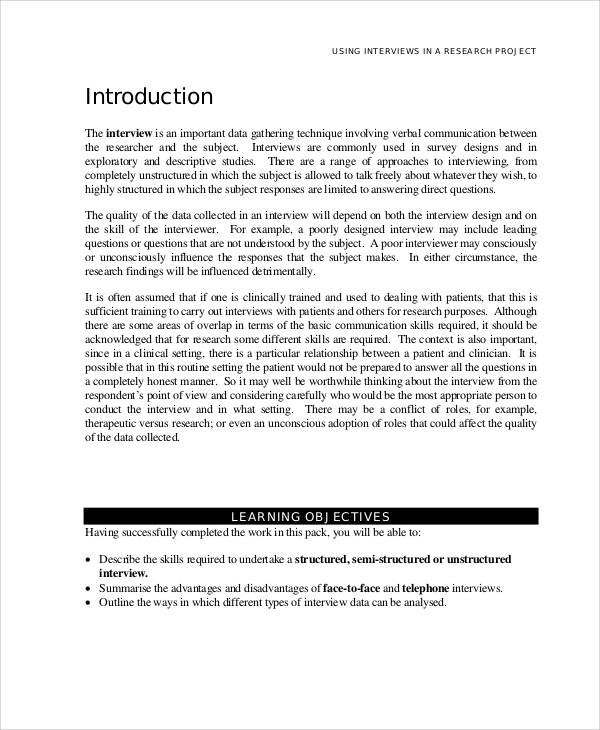
Size: 145KB
Interview Analysis Essay Template
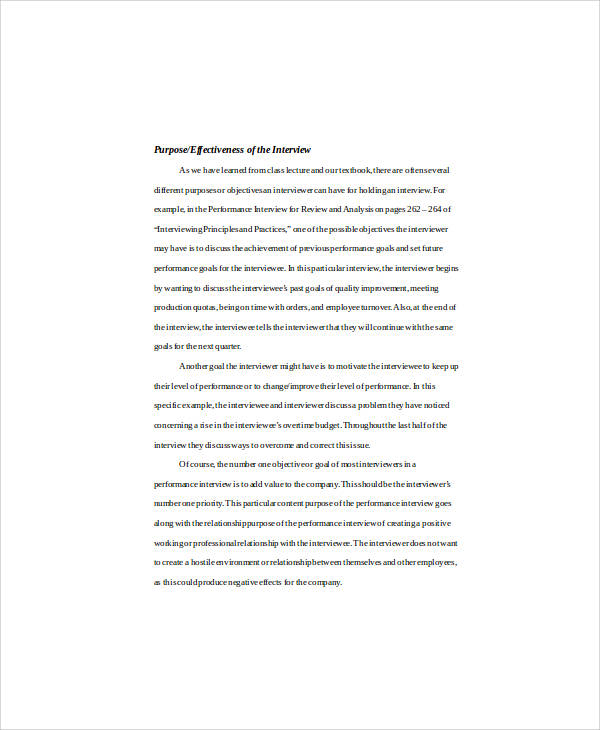
Characteristics of a Narrative Essay
To compose a well-written narrative essay, make sure that your essay does the following:
- Involves the readers. A good narrative essay would engage its readers. When writing a narrative essay, make sure not to just tell a story but show the readers how the events unfolded. Don’t rely on adjectives, make use of sensory details and strong verbs. Let the readers feel as if they are part of the story and not simply just hearing about it.
- Presents important conflicts and changes. Narrative essays should be able to present change. Like a story, it should have a turning point that shows a growth in the character’s personality or way of thinking.
- Has a main idea it wishes to communicate. Narrative essay writers don’t write these essays just for the fun of it. These essays have a point to make. They have a message they wish to communicate to their readers or a sentiment they wish to share. While you’re not exactly required to flat out tell your readers the moral of the story explicitly, your writing should be able to get something out of your writing.
For in-depth guidelines on other types of essays, also see Analysis Essay Samples and other essays we have available on site.
Related Posts
Free 10+ research essay outline samples in pdf | ms word | apple pages, free 10+ templates for persuasive essay samples in pdf, free 10+ essay conclusion samples in pdf, free 4+ mla format essay samples in pdf, free 19+ sample reflective essay templates in ms word | pdf, free 10+ leadership essay samples in ms word | pdf, free 8+ personal essay samples in pdf, free 11+ college essay samples in ms word | pdf, free 11+ sample college essay templates in ms word | pdf, free 6+ descriptive essay samples in pdf, free 9+ scholarship essay samples in ms word | pdf, free 10+ narrative essay outline samples in pdf | ms word | google docs, free 9+ sample personal essay templates in ms word | pdf, free 10+ apa essay samples in ms word | google docs | pdf, free 10+ argumentative essay samples in pdf, self-assessment essay sample - 5+ examples in word, pdf, sample reflective essay - 10+ examples in word, pdf, essay outline sample - 9+ examples in word, pdf, evaluation essay example - 7+ samples in word, pdf.

IMAGES
VIDEO
COMMENTS
1. Think about your essay's purpose. The first step is to think about your essay's purpose. This consideration can help you determine what questions to ask during the interview, how to conduct it and how to write the resulting essay. For example, you may want to write an interview essay as an informative, factual piece for others to educate ...
Guidelines for an Interview Essay. When writing an interview essay, it would be best to create an outline first. Organize the information you have gathered from your interviewee and structure it in a logical order. This could be from one's personal information to the most compelling details gathered. Be reminded of the standard parts of an ...
Check what a narrative interview paper structure looks like when you reach out to several people: Introduction. Paragraph #1 - the first interviewee's perspective. Paragraph #2 - the second interviewee's opinion. Paragraph #3 - the third interviewee's thoughts. Conclusion.
Like a triangle, begin at the top of the paragraph with a narrow-focused summary of the interviewee's main message. Then, continuing the triangle analogy, expand outwards and downwards from that point. Deliver the broader context for why the interview matters. To end the essay, quote how the interviewee said goodbye.
2. Plan an outline of the essay. The outline will depend largely on the essay format you are following, but a strong introduction, which clearly identifies your subject and the goals and focus of your interview, is always important. [8] Read over your interview notes and listen to any audio / video recordings you have.
Write your questions. Set up a time to meet with people (you will probably start with at least one in-class interview of another student). Ask questions and record the answers. Analyze the results. Write your essay. Start with the question, followed by a summary and analysis of the questions and answers.
A standard interview essay from a custom writing service can range from 2,000 to 5,000 words or up to ten pages. Individual works are usually shorter. The interview essay format will have an introduction, body segments (perspectives grouped under different subheadings), and a summary. Here's an overview of what to put in each part.
An interview essay is a written composition that presents the insights, experiences, and viewpoints of an individual obtained through a structured conversation or interview. This type of essay goes beyond merely summarizing the interviewee's responses; it integrates narrative storytelling with analytical components to provide a comprehensive ...
Interview Questions About Your Personality . What They Want to Know: Your interviewers know the personal strengths and quirks of their current team members, and thus they will be most interested in hiring the candidate they feel could enhance their team dynamics.Your tone and body language in answering these questions are as important as your actual responses—use them to express your ...
9+ Free Downloadable Scholarship Essay Samples, Examples and Formats. 9+ Argumentative Essay Templates - PDF, DOC. 8+ Sample Scholarship Essay Templates. 19+ Best Microsoft Word Essay Templates. 9+ Simple Expository Essay Templates. 18+ Printable Reflective Essay Templates. 9+ Best Personal Essay Templates. 7+ Sample Persuasive Essay Templates.
Writing an Interview Essay Body Paragraphs. The body paragraphs hold the majority of the essay. Provided paragraphs support the central statement with relatable facts, details, and key points as the answers that an interviewer asks. Some of the interviewers prefer to use a recording device, while others opt for notes to contain the important ...
Step three: The interview. If at all possible, arrange to conduct the interview at the subject's workplace. It will make them more comfortable, and you can write about their surroundings. Develop rapport that will make the interview easier for both of you. The more silence in the room, the more honest the answer.
As one would expect during a job interview, your employer may be asking you to write something. This would be in the form of an essay. This is usually about your experiences, your skills and all the basic information they need to know more about you. They do this to see and to understand you as a person. Here are some 7+ job interview essay ...
Personal Statement Examples. Essay 1: Summer Program. Essay 2: Being Bangladeshi-American. Essay 3: Why Medicine. Essay 4: Love of Writing. Essay 5: Starting a Fire. Essay 6: Dedicating a Track. Essay 7: Body Image and Eating Disorders. Essay 8: Becoming a Coach.
Stuck on your essay? Browse essays about Interviews and find inspiration. Learn by example and become a better writer with Kibin's suite of essay help services.
Leadership interview essay examples contain "How Steve Jobs became the richest," "Alexander the Great who conquered the world" (write an essay based on imaginary interview), "CEO of my company," "How I managed to turn a PM in two weeks," etc. "A leader is one who knows the way, goes the way, and shows the way". John C. Maxwell.
Here are 10 examples of these types of personal questions, as well as some tips on how to effectively answer them: 1. Tell me about yourself. This is where you give what's known as your " elevator pitch ." In other words, it's a quick summarization of you.
In writing a personal essay (or essay examples in doc ), a writer must keep the following things in mind. 1. Pick a topic. Choose a topic that is both timely and significant in your area. Your life story can also be considered as a great topic in writing your personal essay.
A Personal Journey of Immigration [Interviewee's Name]'s journey as an immigrant began when they left their home country of [Country of Origin] in pursuit of new opportunities and a better life.
Descriptive Essay Example - 6+ Samples in PDF. It is a word that inspire dread in the hearts of many students, especially when the purpose of their essay is not just to get a good mark but to impress a bunch of academic authorities. The difficulty of essay writing expands tenfold when what relies on how well you write your essay is no longer ...